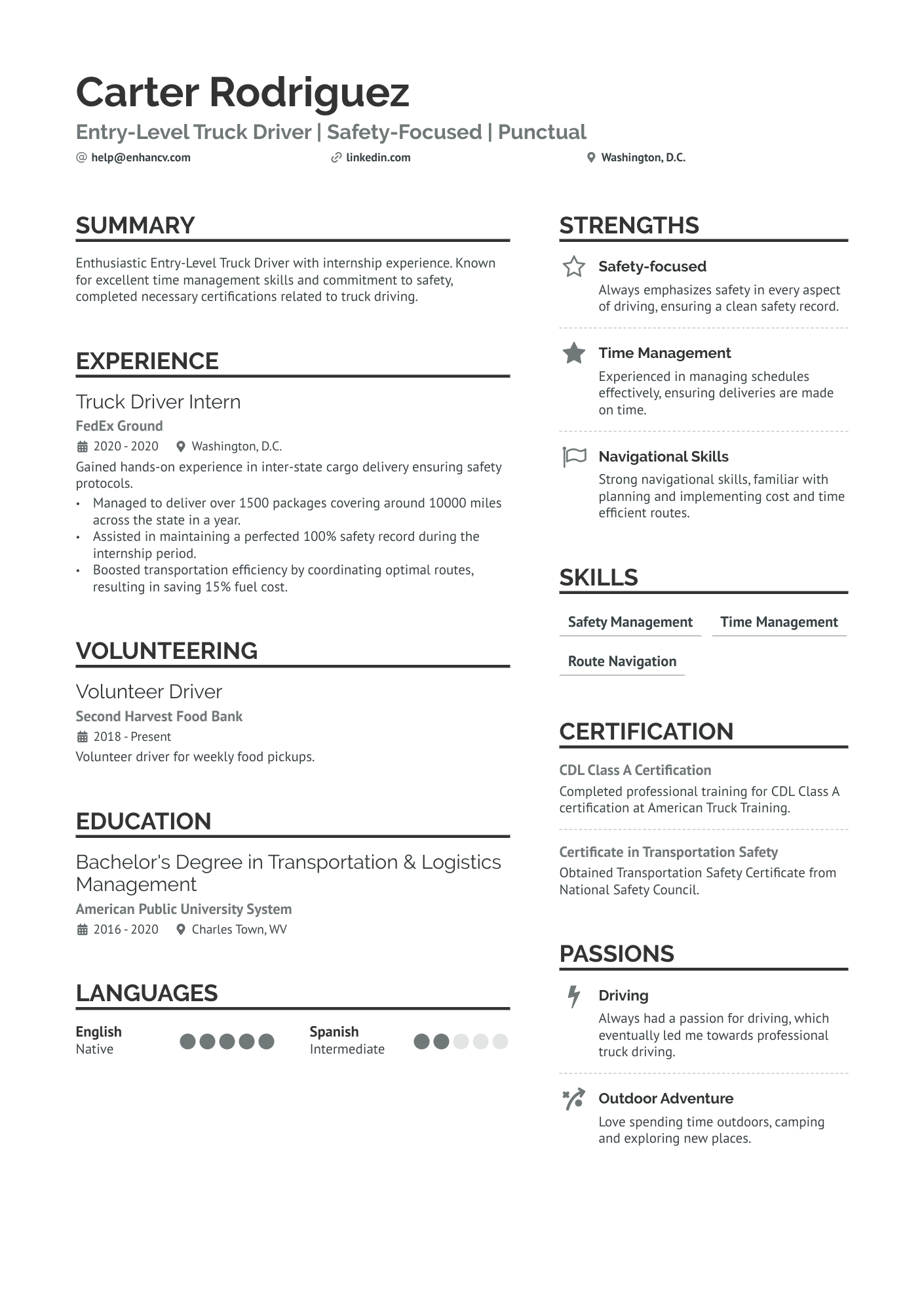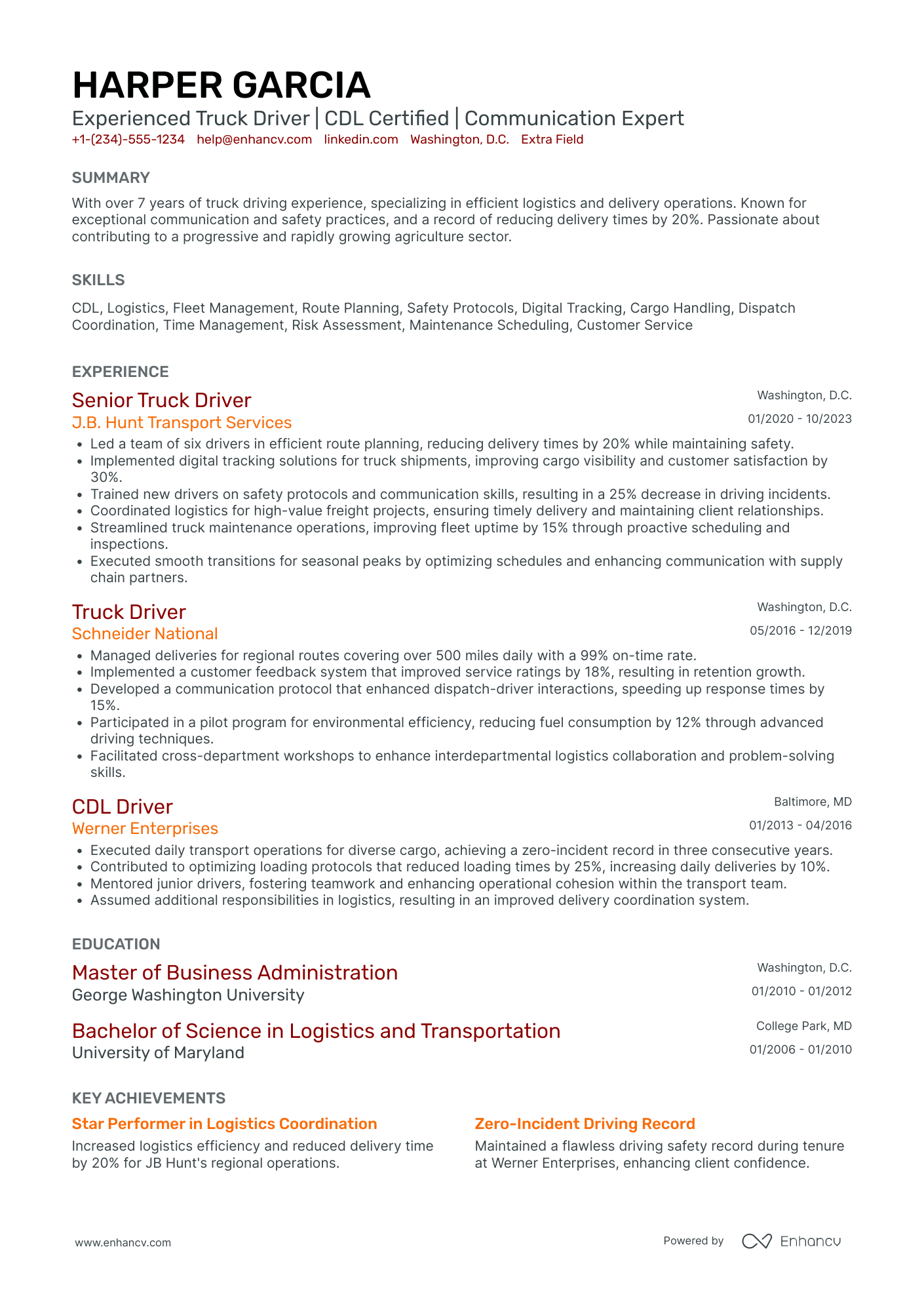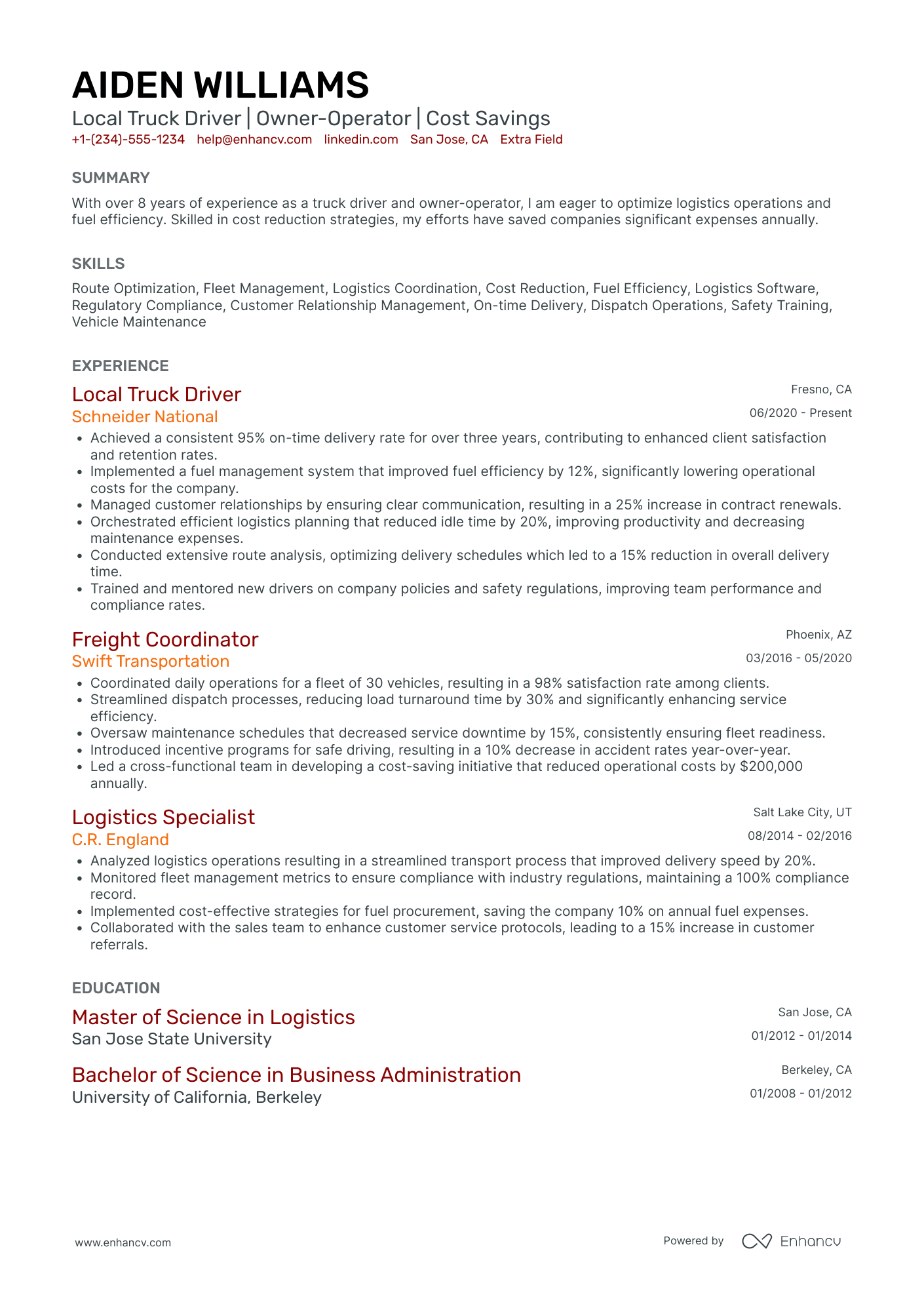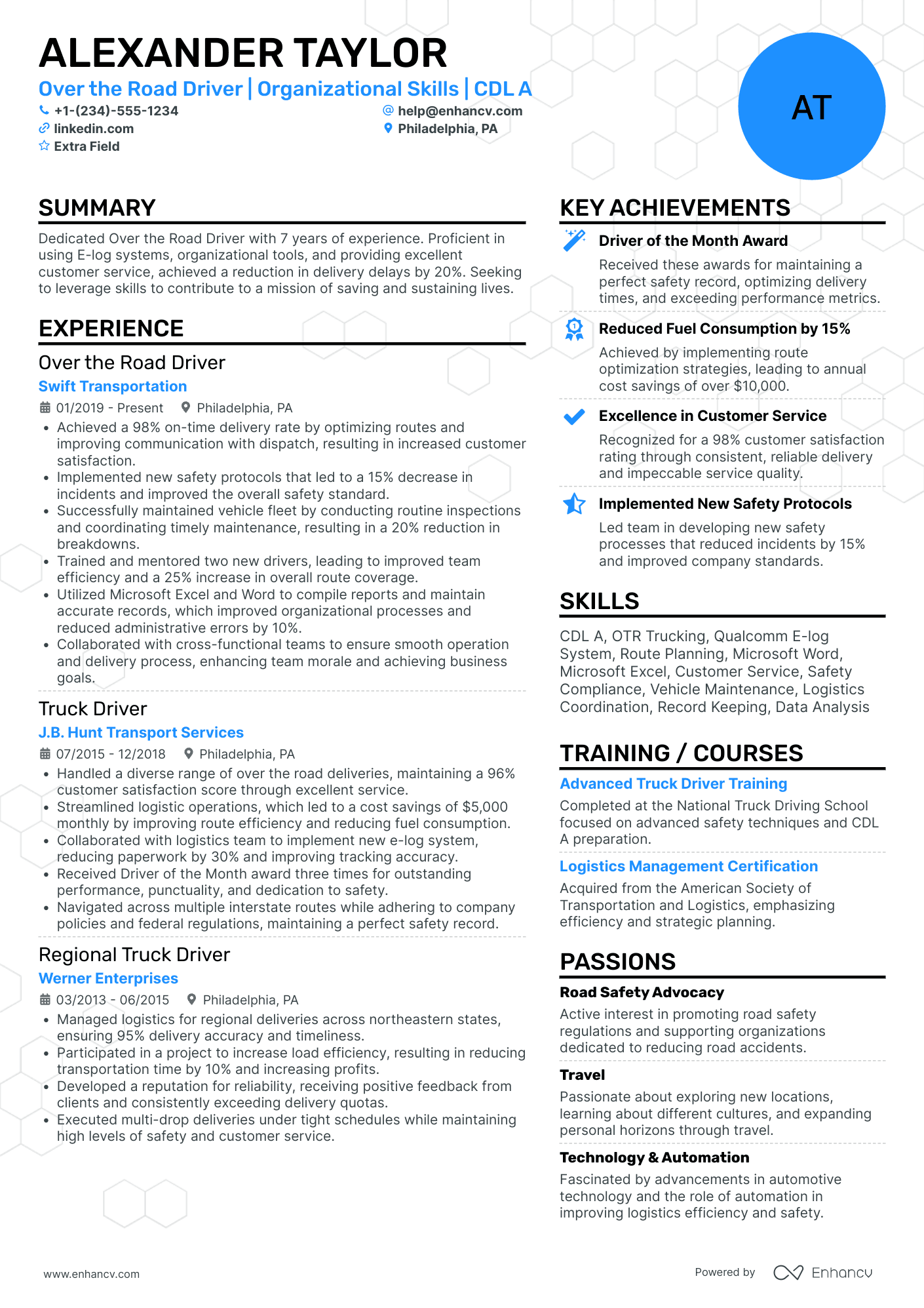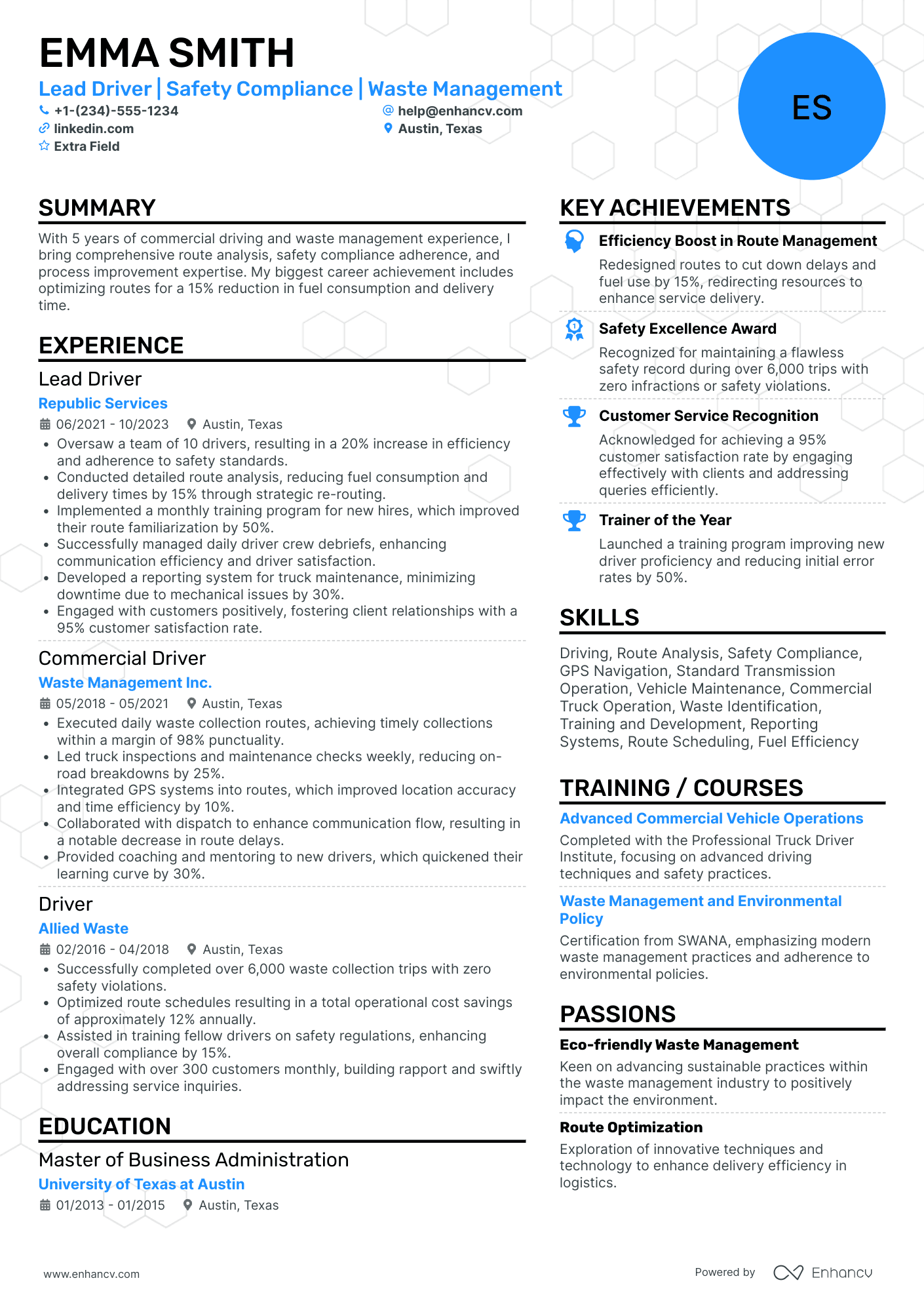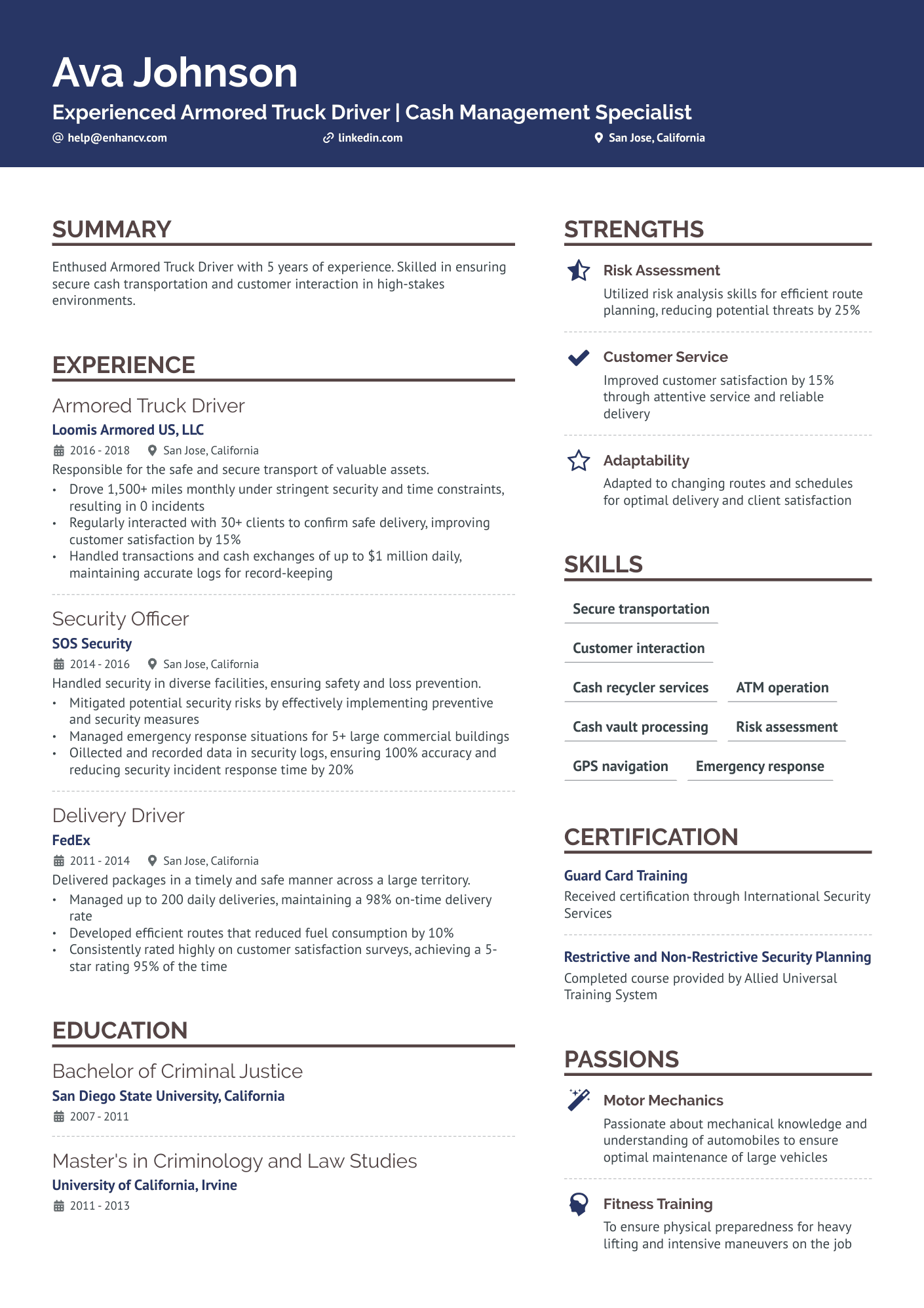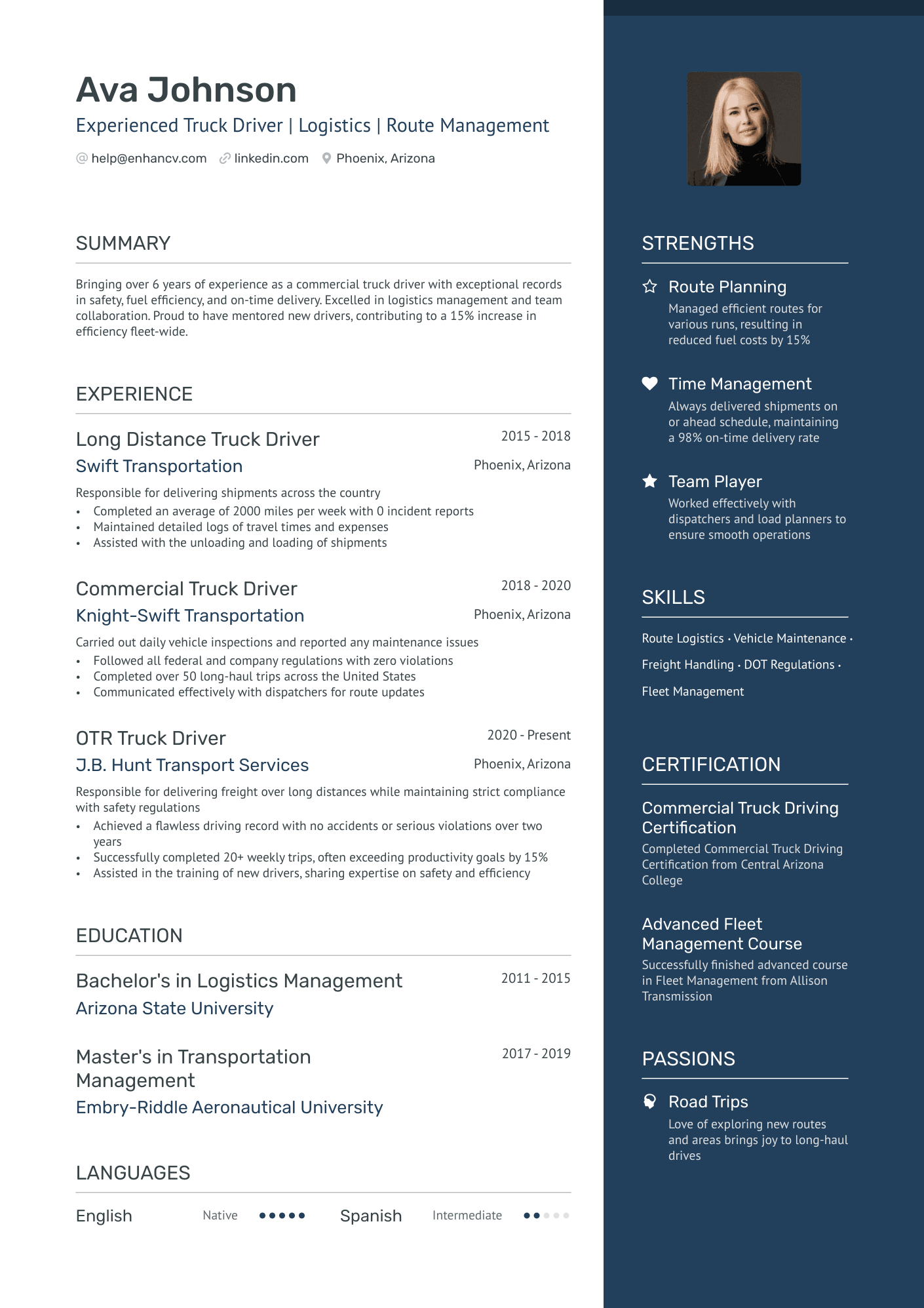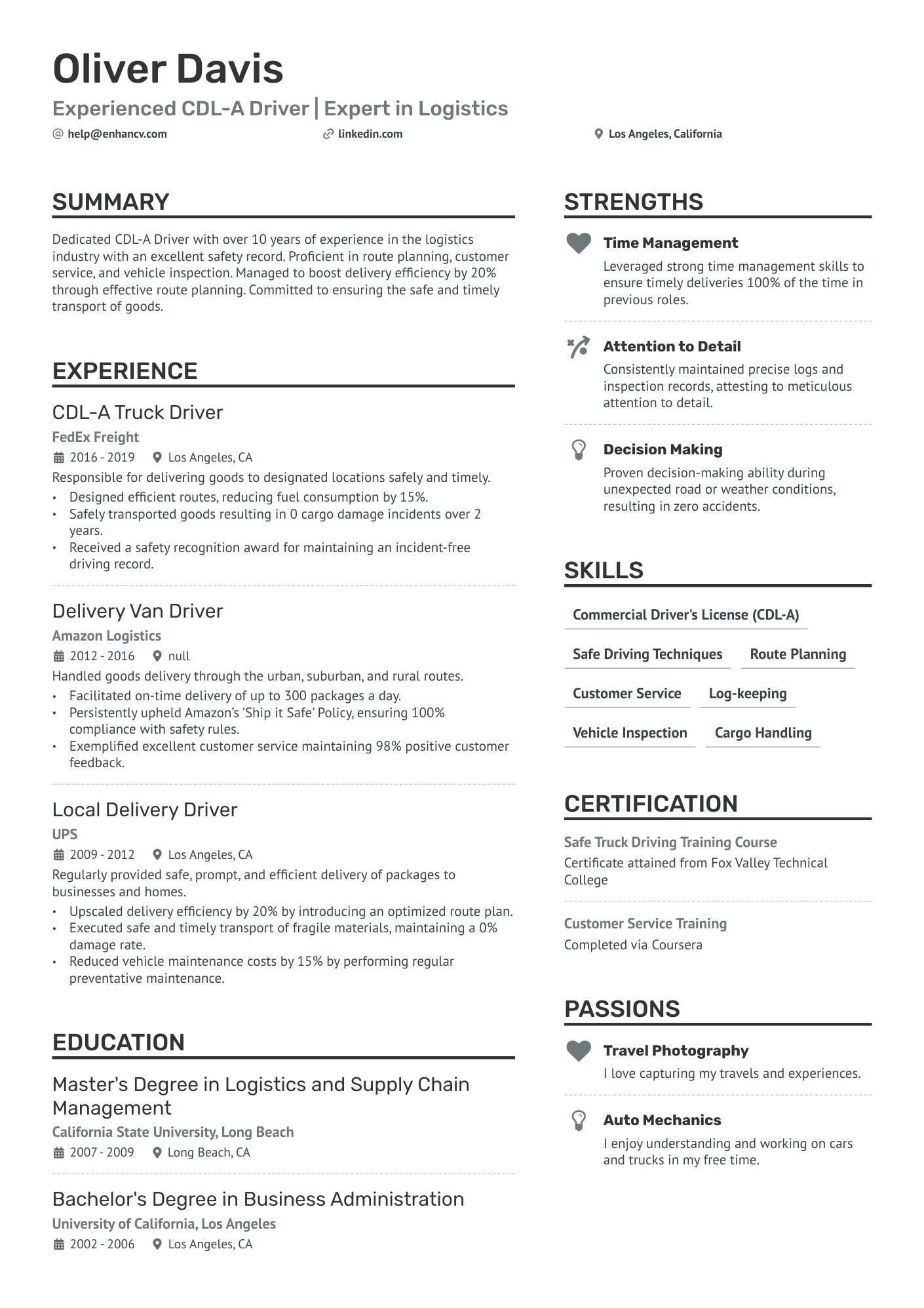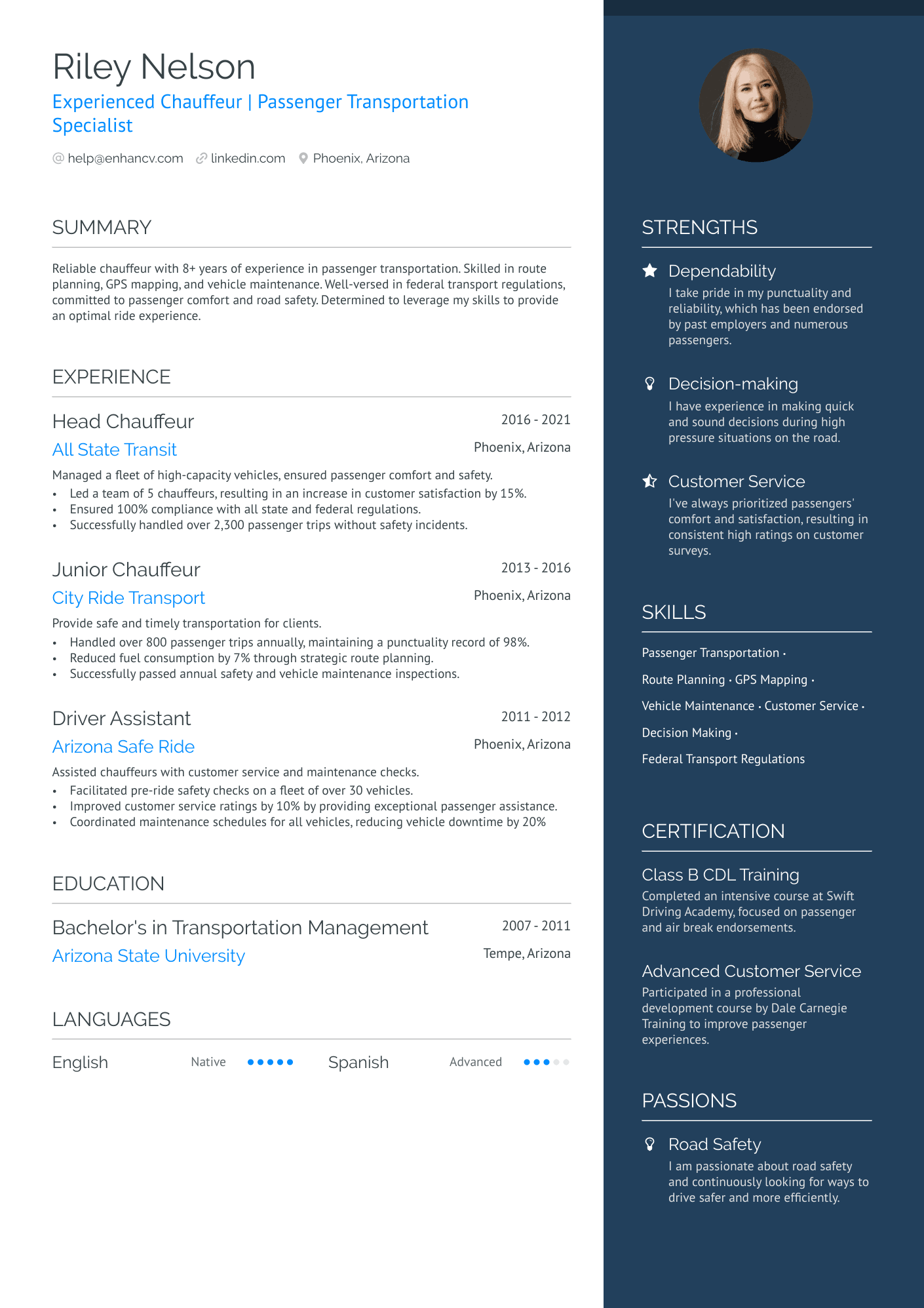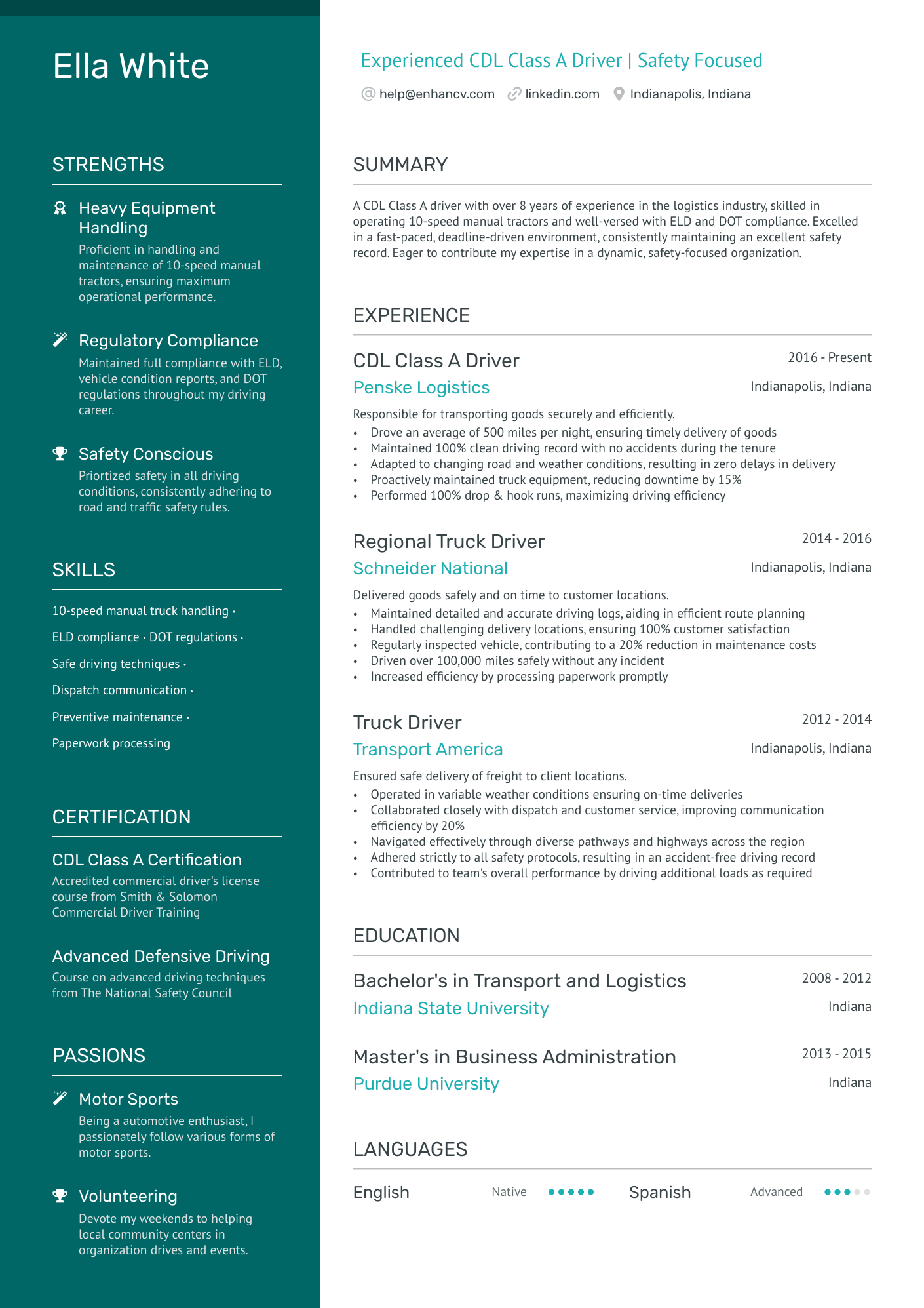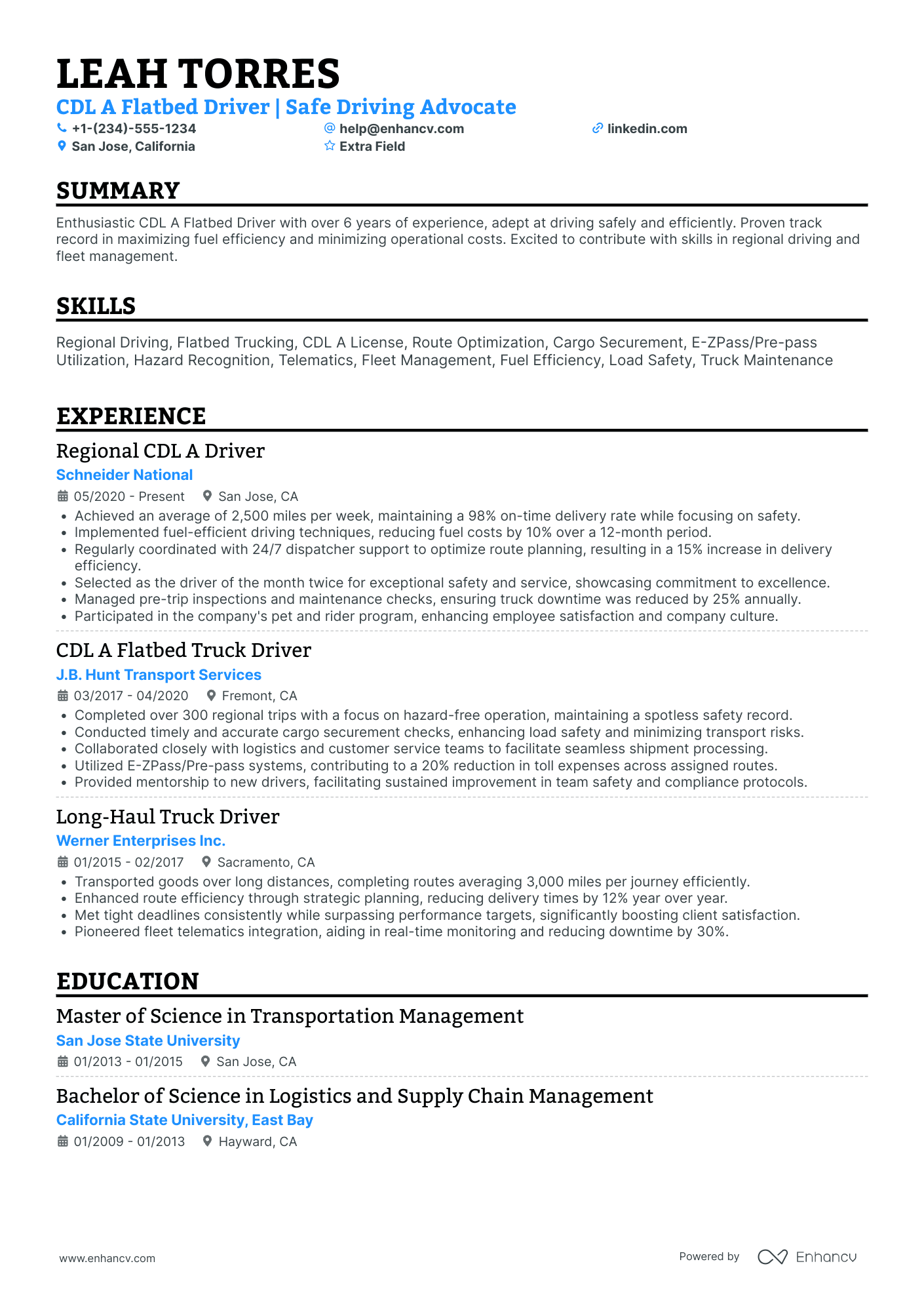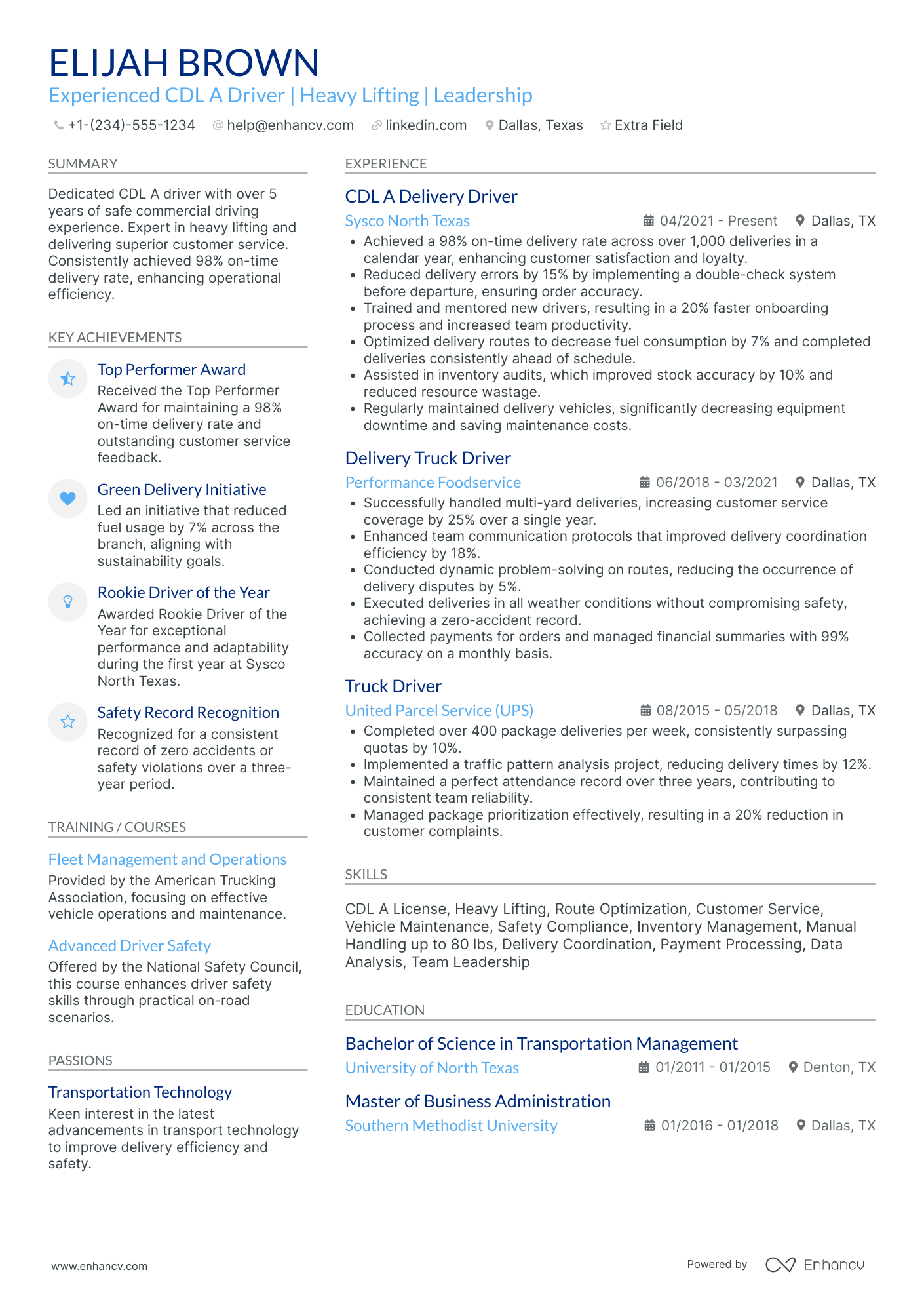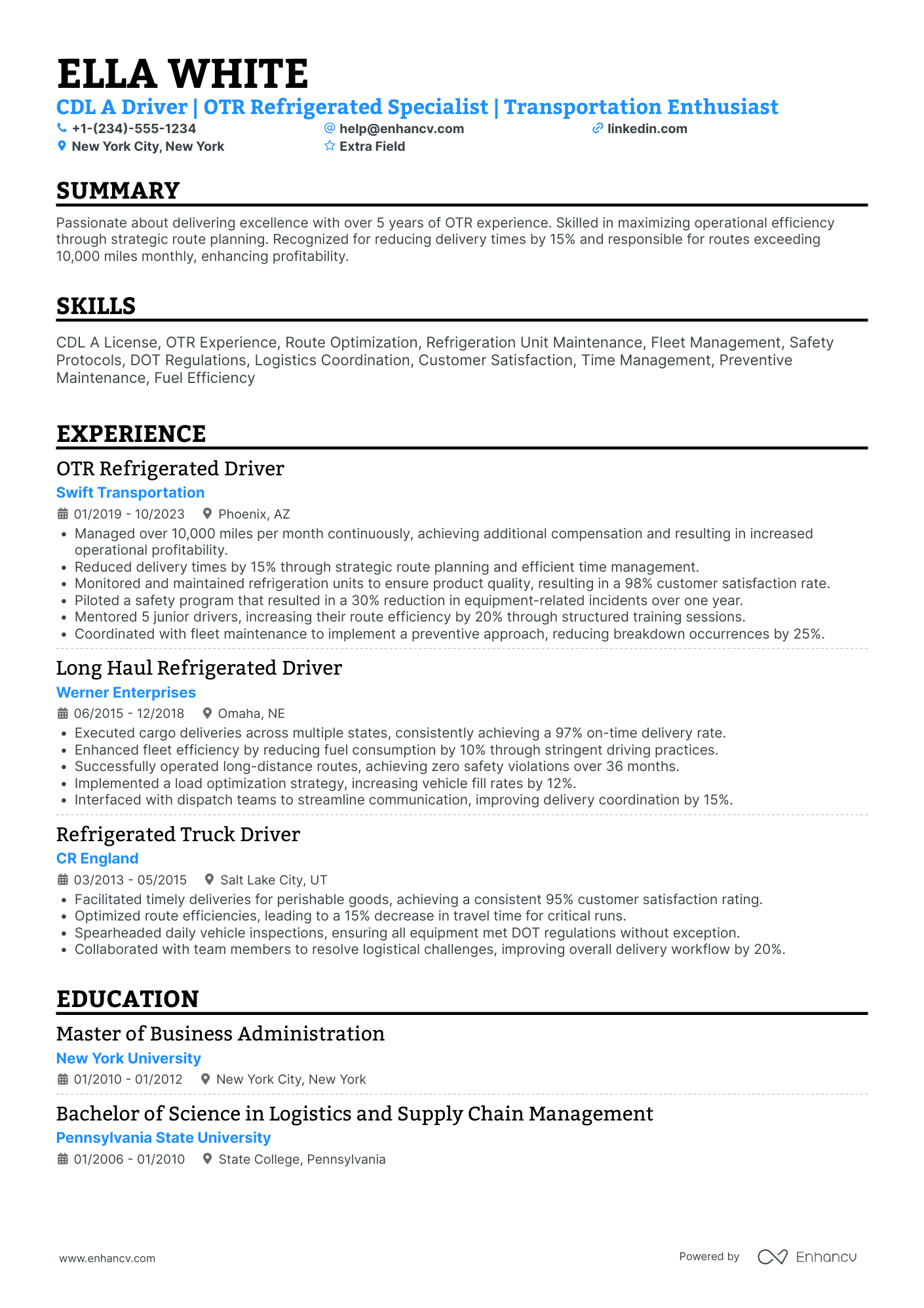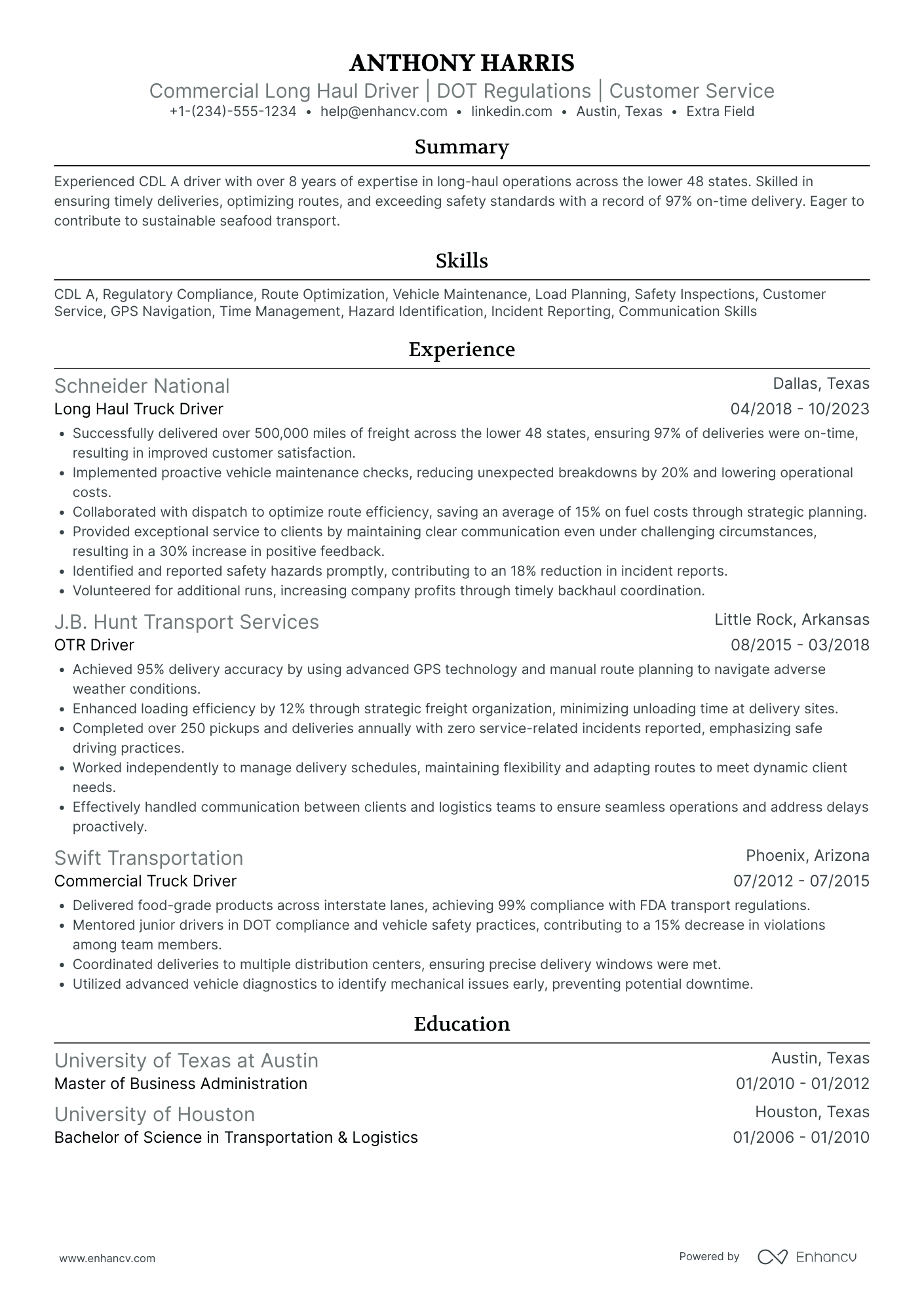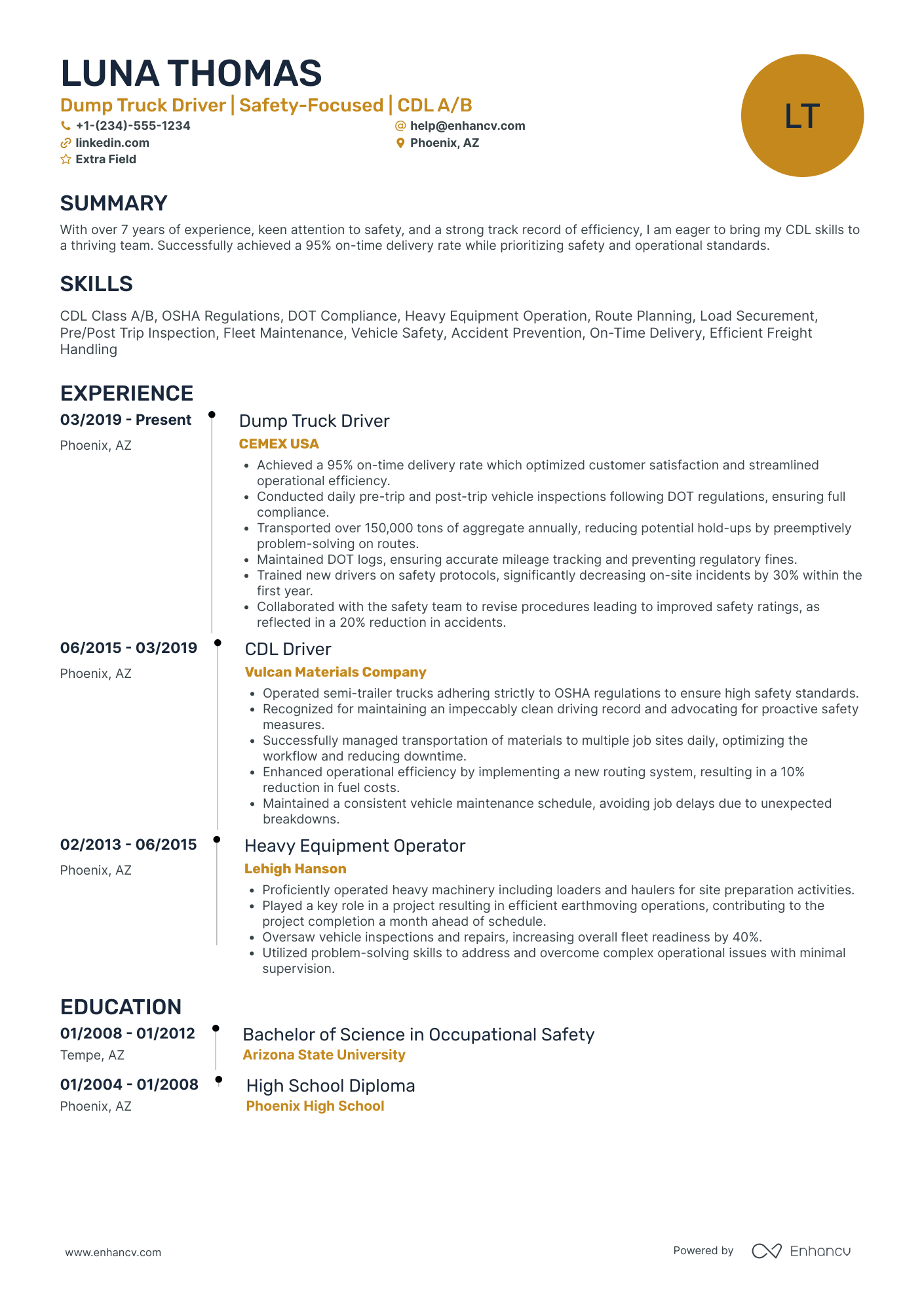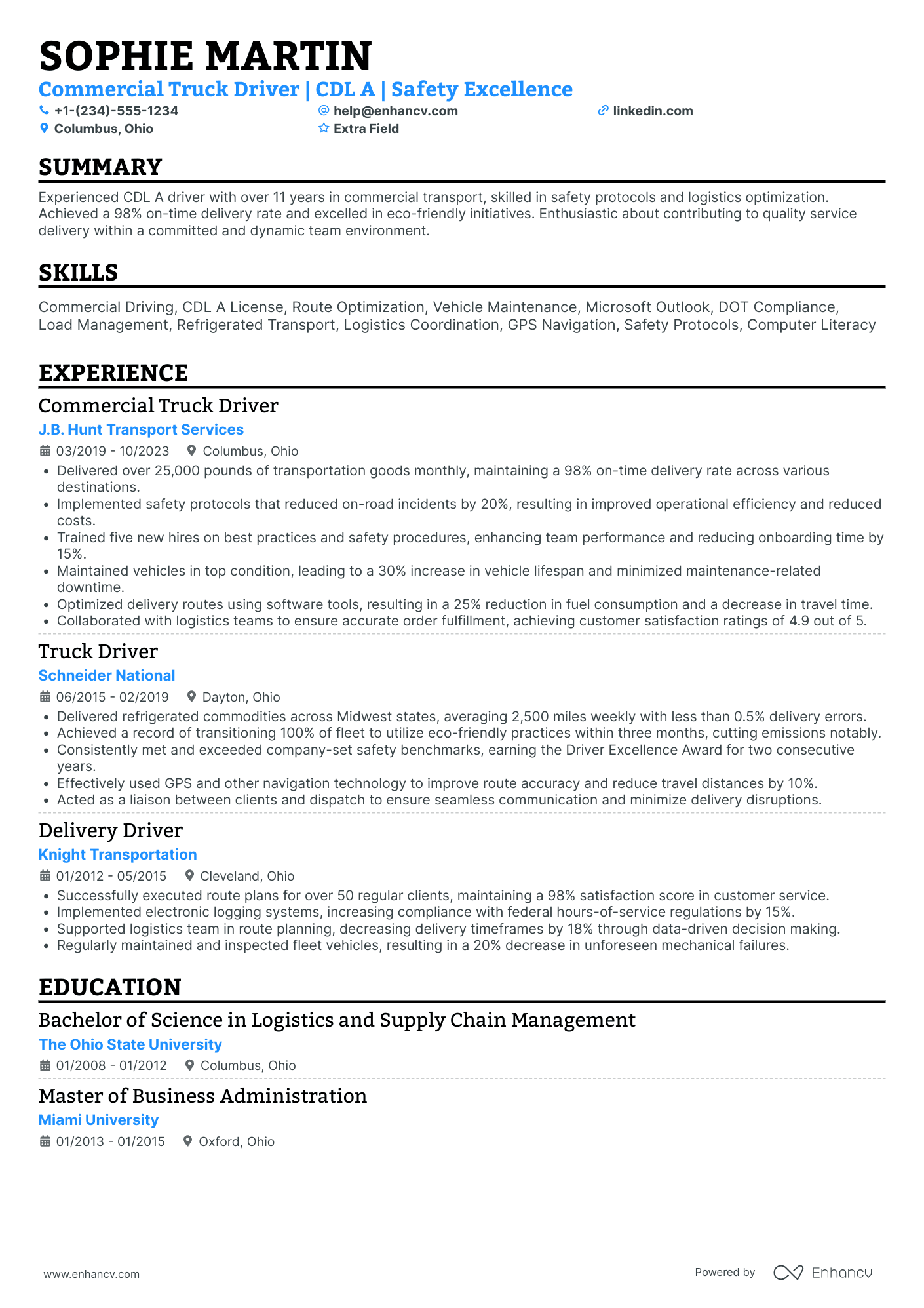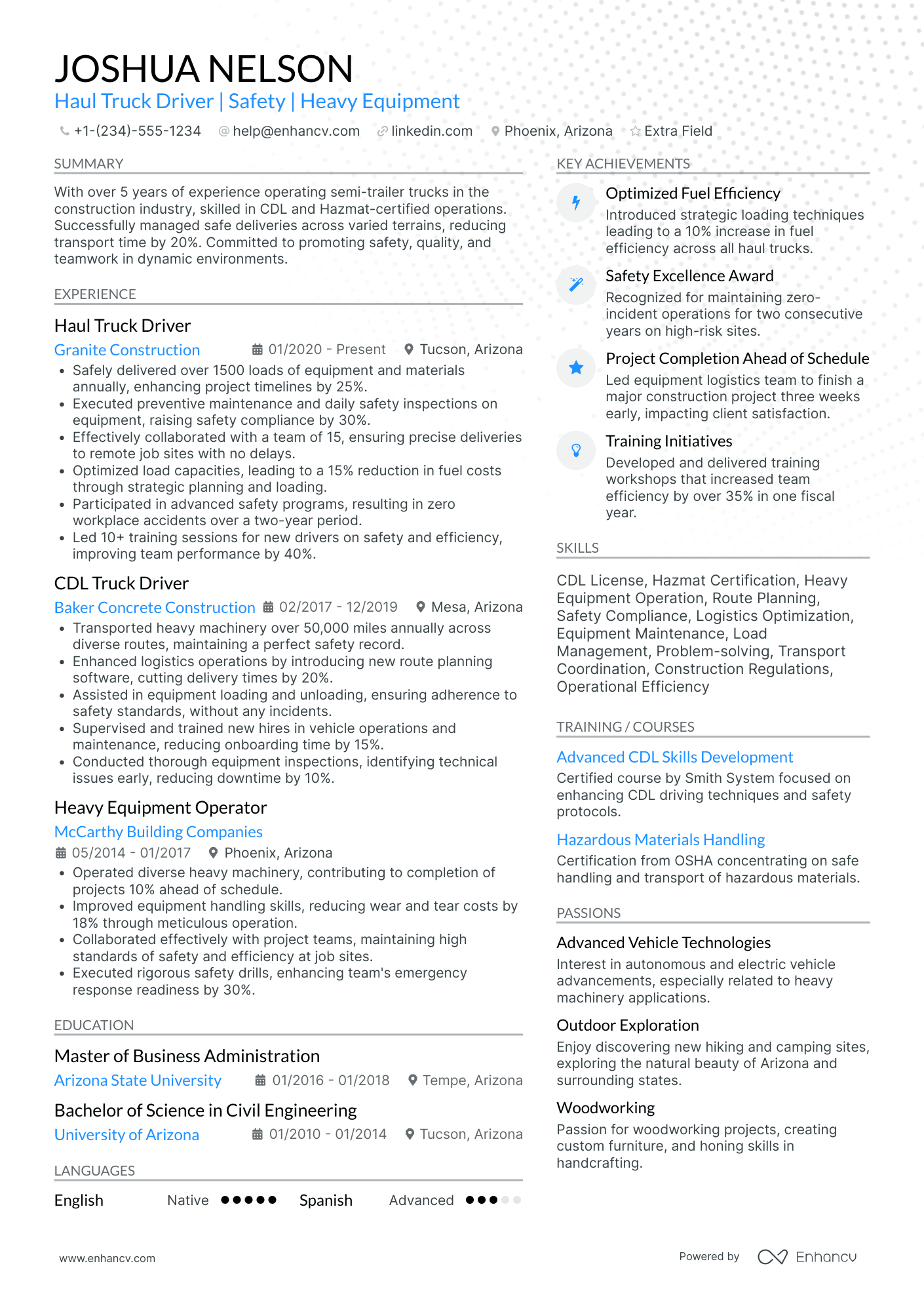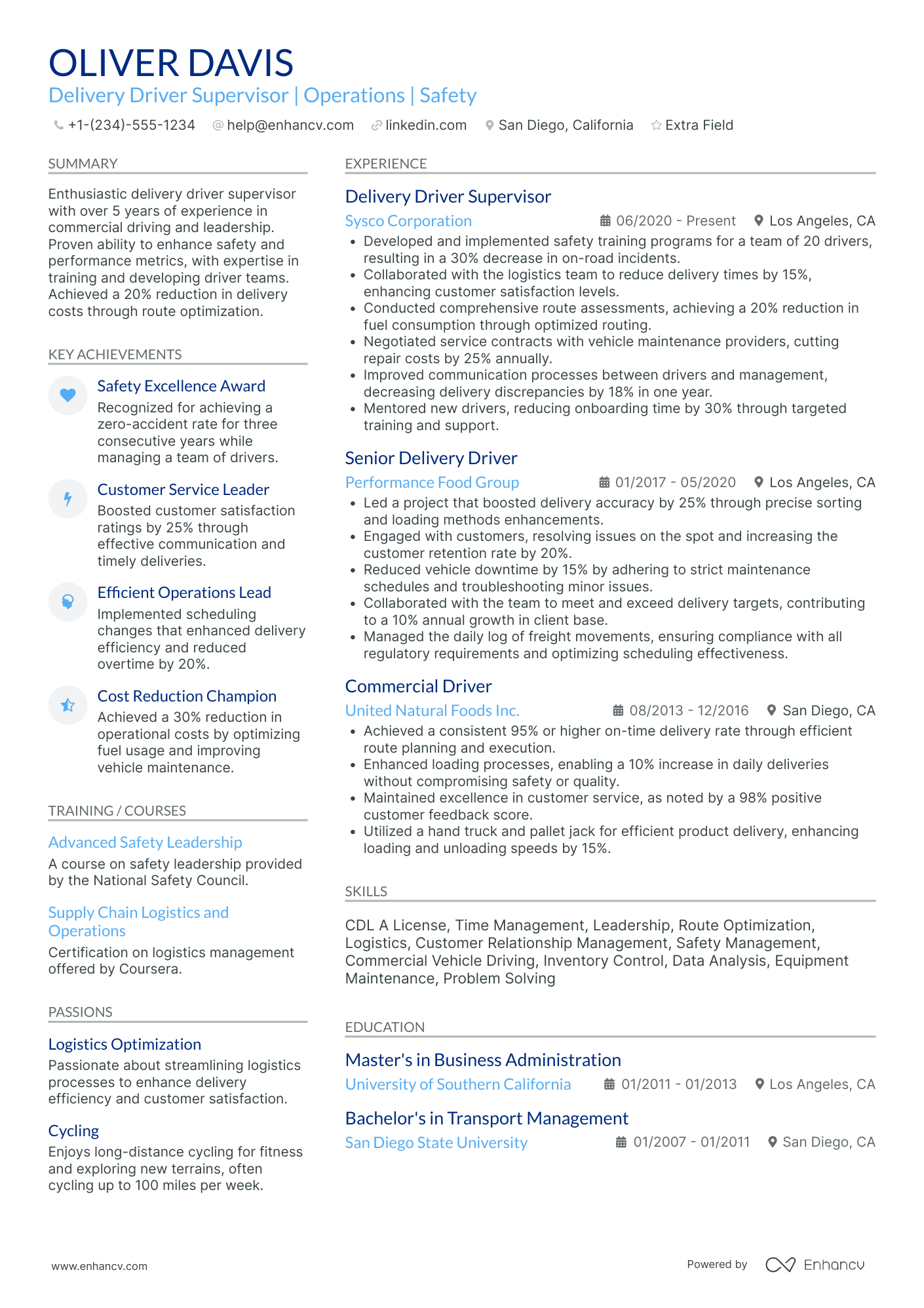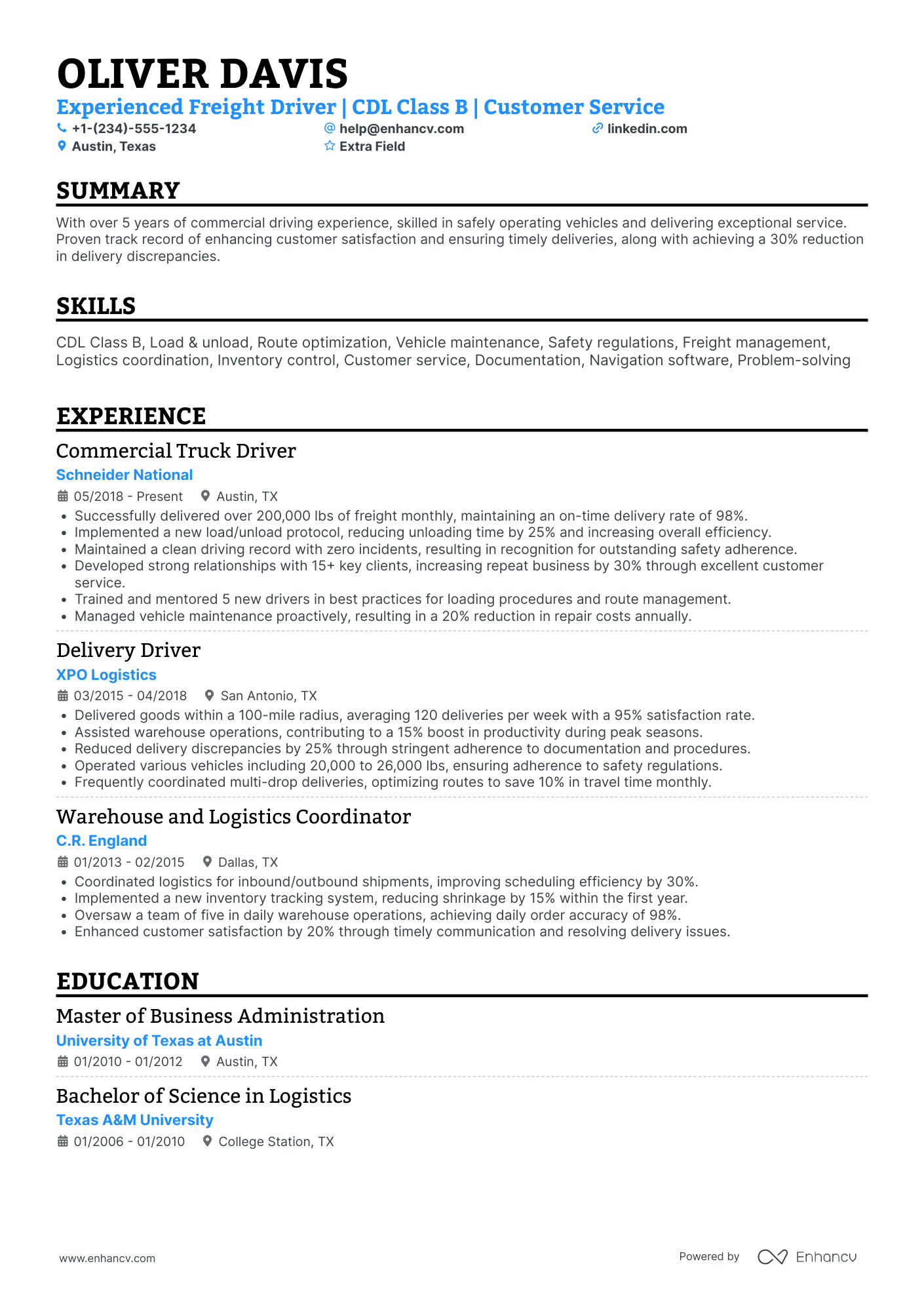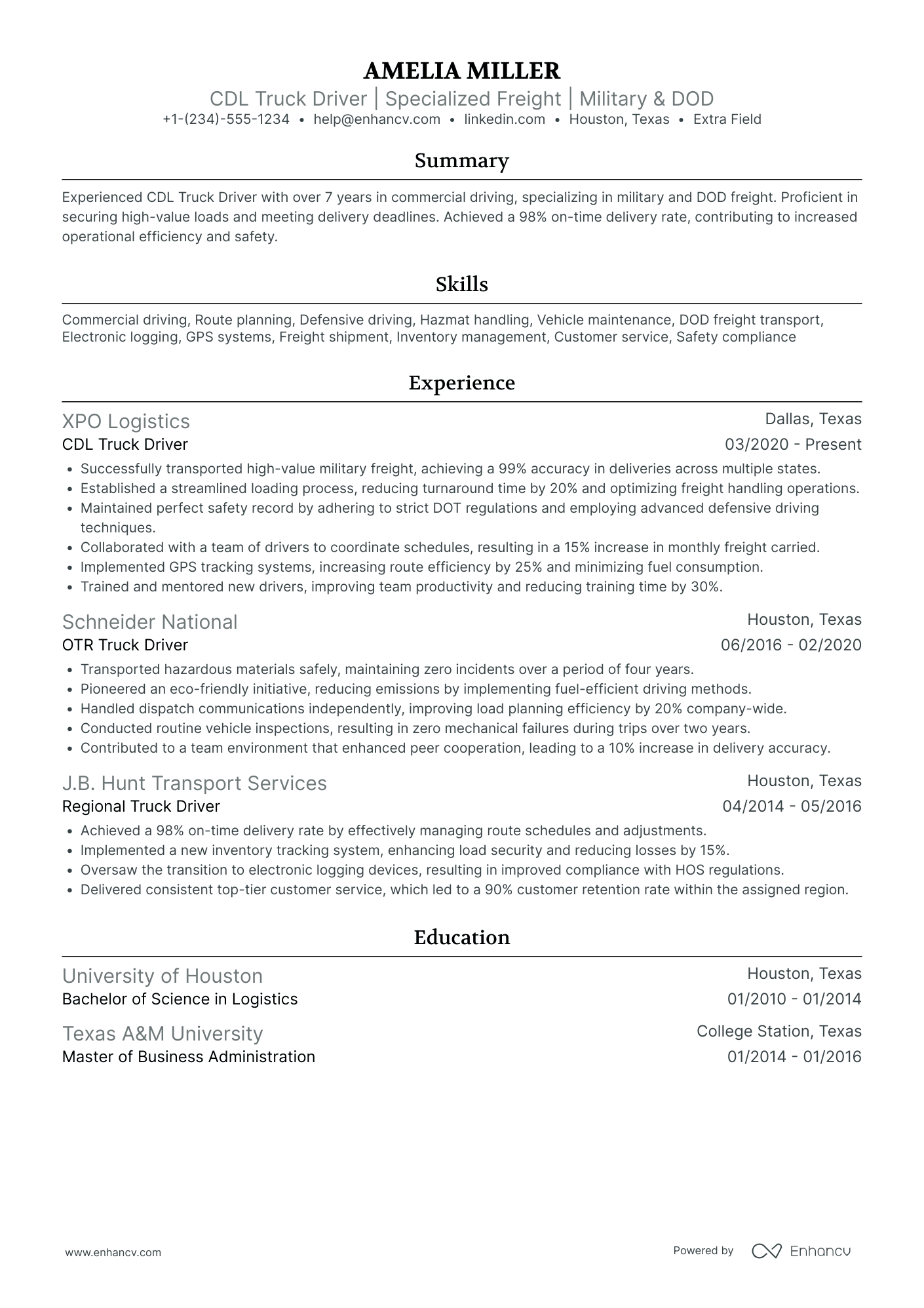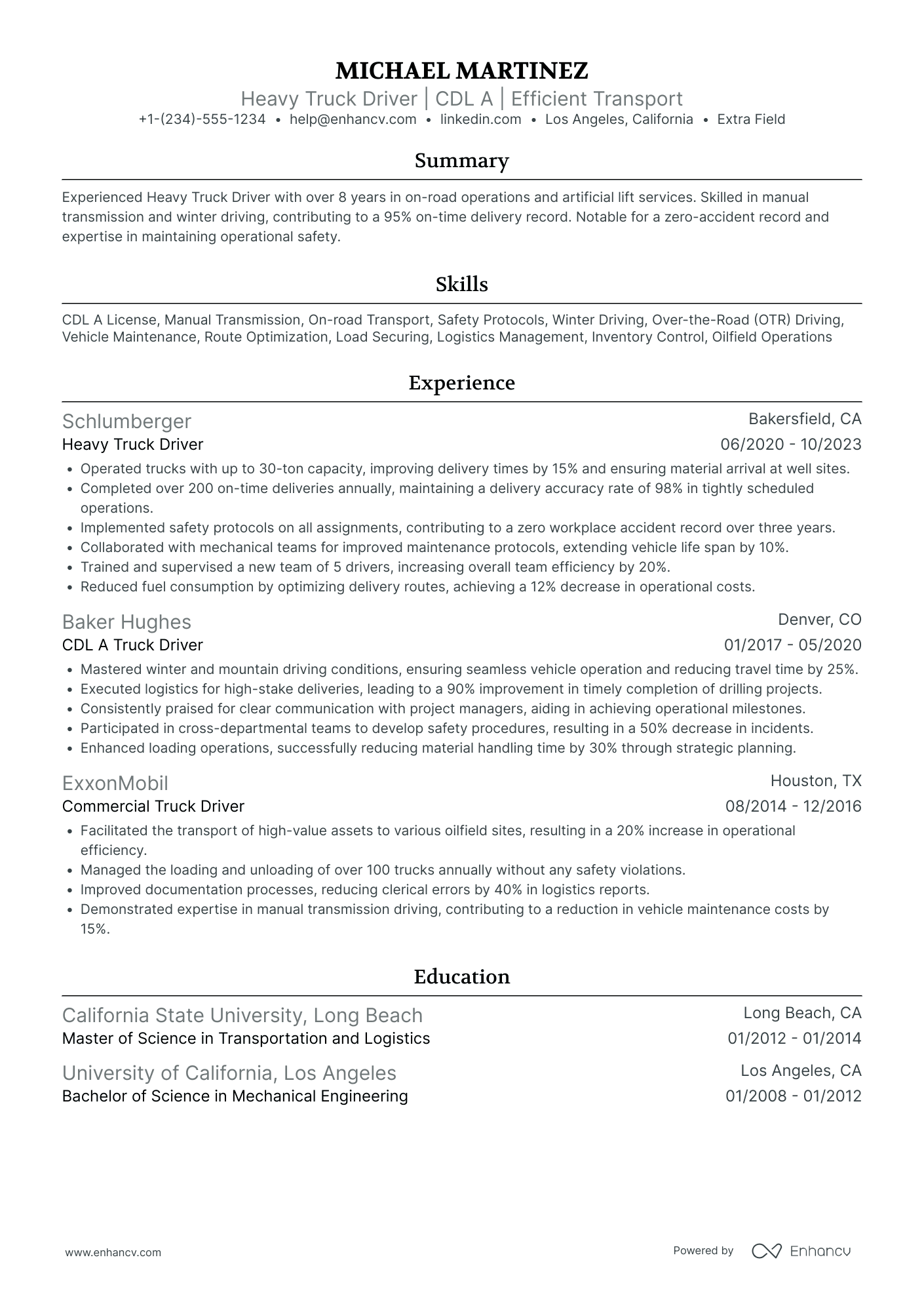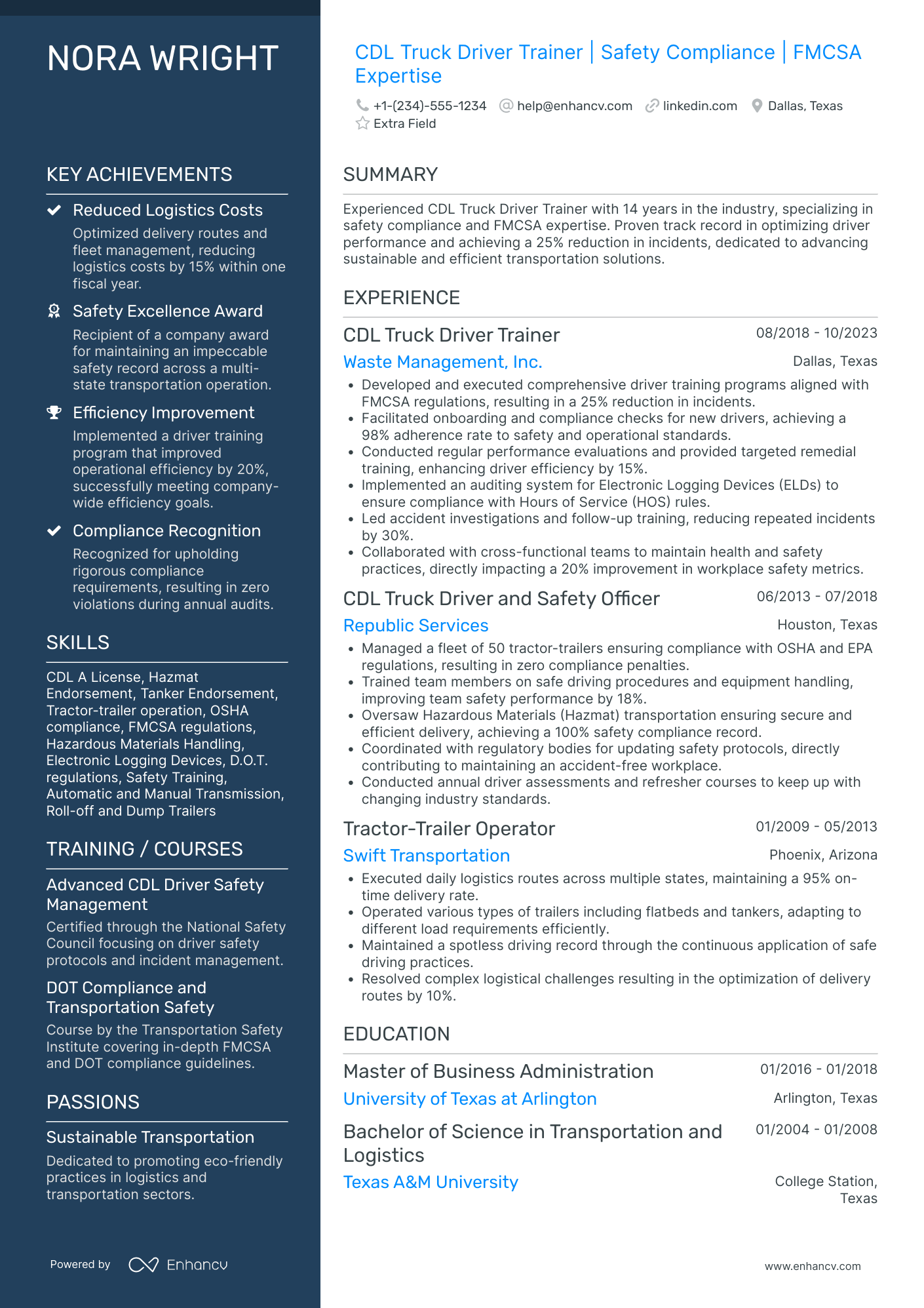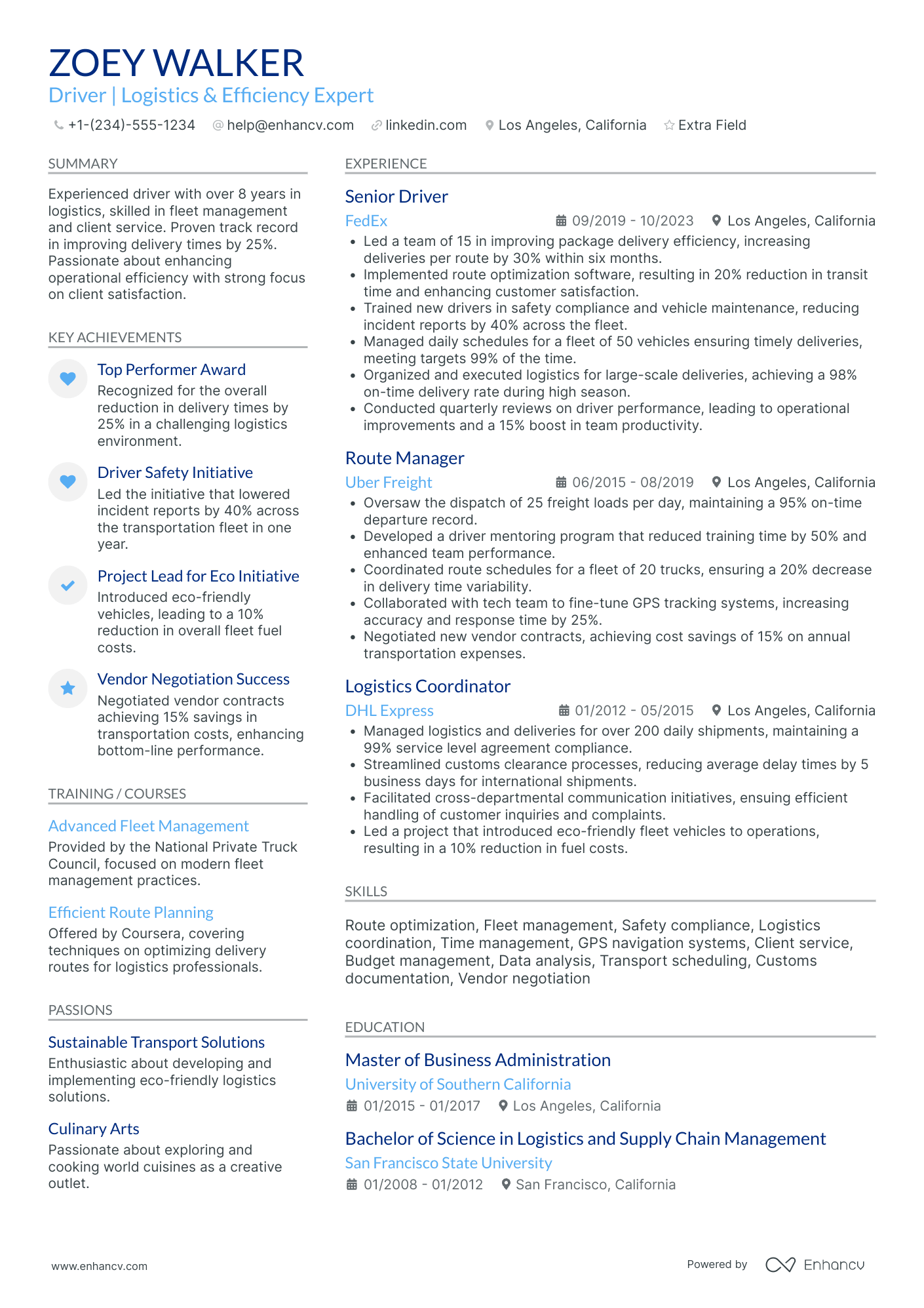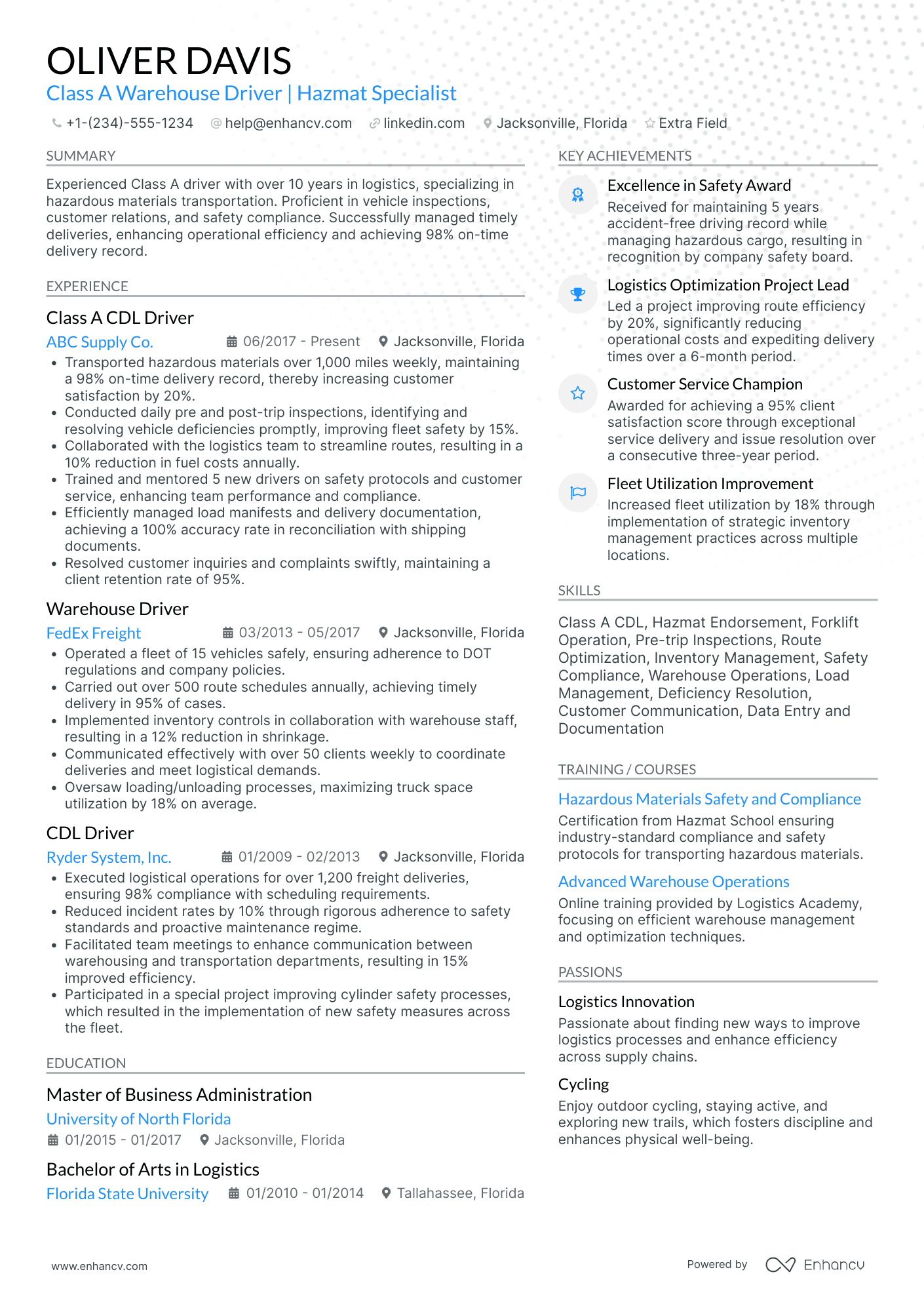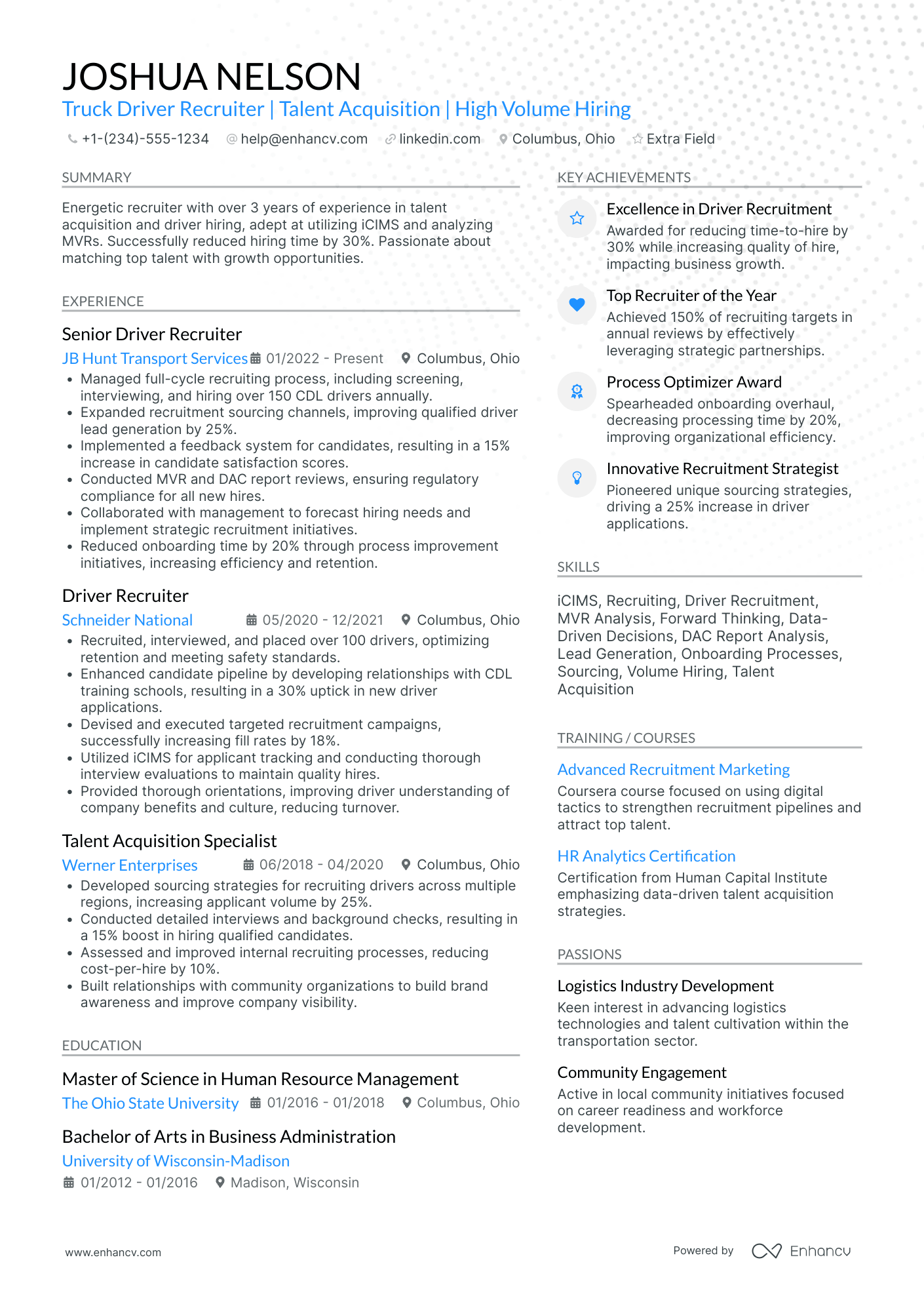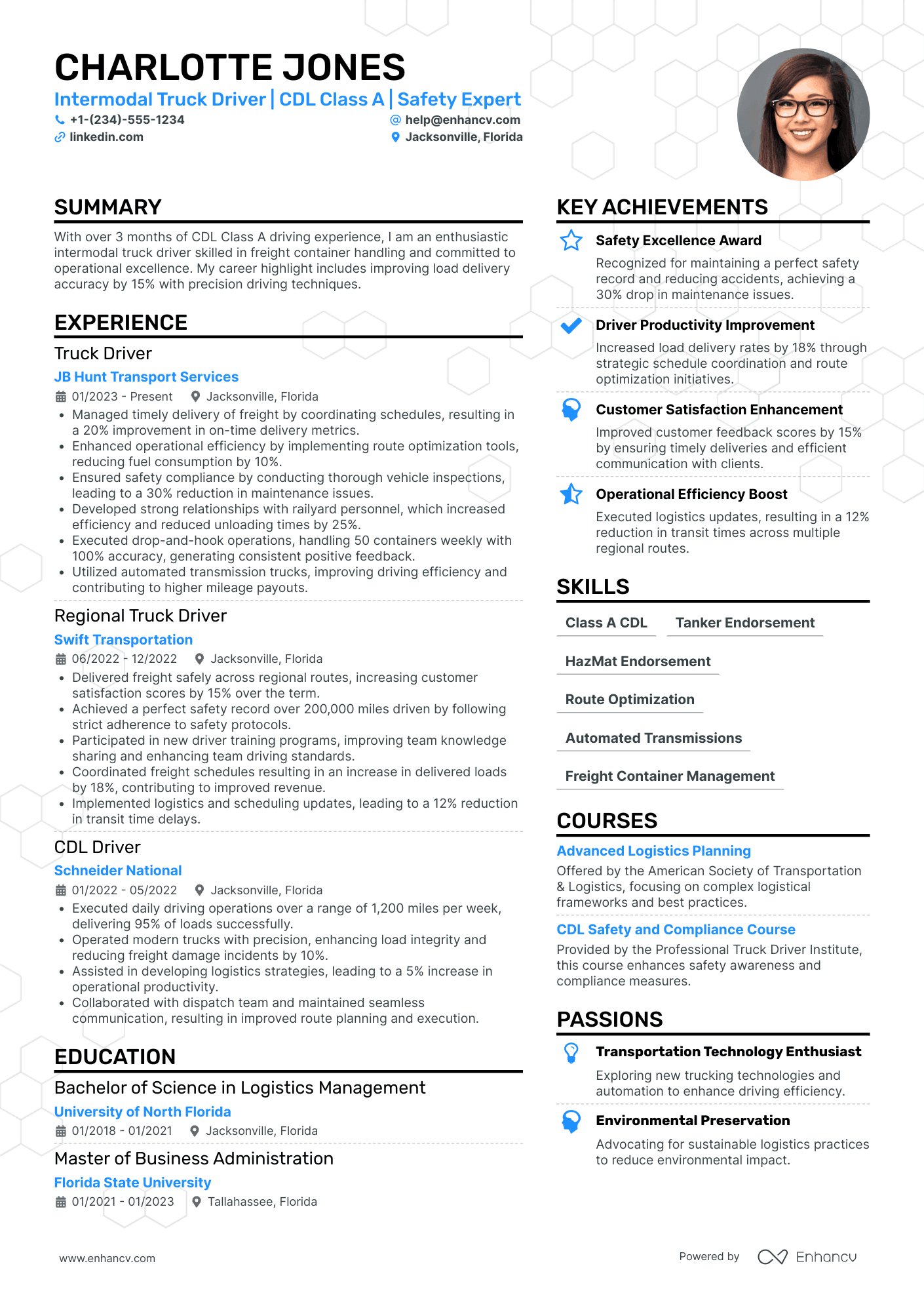The American Trucking Association predicts that by 2030, the trucking industry could be short by 160,000 drivers. The shortage of truck drivers is becoming increasingly severe as demand for goods rises and many current drivers age and approach retirement. This situation creates numerous opportunities for those looking to start a career behind the wheel. However, it’s important to understand that truck driving isn't just about earning a high salary and enjoying the open road with a good view and the miles that fly by.
The reality of the job includes dealing with traffic and navigating construction zones, and you might even end up waiting for fuel or eating a stale burrito for dinner.
Despite that, if you are determined to start a job as a truck driver you'll need a proper resume. That's where we come in to help you.
Here’s what we’ll cover in this truck driver resume guide:
- How to format your resume so it looks neat, organized, and easy to read;
- How to tailor the experience section to the truck driving job you’re applying for;
- Which skills are vital to include in a truck driver's resume;
- How to decide which certifications and licenses to include;
- What additional sections are worth featuring on a truck driver's resume.
If you're interested in other jobs related to road traffic and transportation, we have more options for you below.
How to format a truck driver resume
Choosing the right resume format is vital, as this can set your application apart. Your options include three main formats:
- If you're an experienced truck driver, using a reverse chronological resume is a smart choice. This format lists your jobs starting with the most recent and working backwards, showcasing your work experience in the industry.
- In case you're new to truck driving, switching careers, or have some gaps in your work history, a functional resume might work better for you. This type focuses more on your skills, rather than the order of your jobs.
- The hybrid resume is another great option. It combines the best parts of both the reverse chronological and functional resumes. This format lets you highlight your most relevant skills and achievements right at the top, followed by a brief work history. It's especially helpful if you want to draw attention to specific experiences that directly relate to the job you're applying for.
Here are some practical tips to capture recruiters' attention:
- Select a resume template that grabs the attention right from the start. A two-column layout can hold a lot of information and is quick to scan.
- Use legible fonts like Rubik, Lato, or Times New Roman. Keep the font size between 10 and 12 points for the best readability.
- Look through the job description to find out if you need to add a photo to your resume. In the US, it's typically better not to include one unless it's asked for.
- Keep your resume margins at 1 inch wide on every side to help your resume look neat and well-structured.
- Start with a header that includes your name, professional title, contact details, and a LinkedIn profile link.
- Always save your resume as a PDF file to ensure the formatting stays consistent on any device.
Remember, resume layouts can vary by country – for example, a Canadian resume format could look different.
A resume length longer than two pages would deter 17% of hiring professionals.
Keep in mind that standard formatting is essential for truck driver resumes because Applicant Tracking Systems might not accurately read or might even skip important details in resumes with unusual layouts, graphics, or creative section titles.
Take advantage of using our intuitive AI resume checker. It evaluates your resume on 16 critical points for free.
Is your resume good enough?
Drop your resume here or choose a file. PDF & DOCX only. Max 2MB file size.
Think about including these essential resume sections to improve your application.
The top sections on a truck driver resume:
- Personal details section: Add your current contact details and professional title, making it easy for recruiters to get a quick snapshot of you.
- Licenses section: Stating your commercial driving license (CDL) and relevant endorsements such as HazMat, Tanker, and Doubles/Triples shows you're legally entitled to drive various types of trucks.
- Professional experience: List your previous employment related to truck driving, showing your experience, the types of trucks you've handled, and the routes you've covered.
- Skills and abilities: Highlighting specific skills e.g., time management, ability to use GPS and route navigation apps, etc. demonstrates your competency in essential areas that directly impact truck driving roles.
- Safety and compliance record: Trucking companies follow strict regulations, so highlighting your clean driving record and commitment to safety can make you stand out to employers by showing your reliability and responsibility.
Now, think about what recruiters are specifically looking for in these sections and how they might evaluate your application.
What recruiters want to see on your resume:
- Commercial driving license (CDL): A CDL is a must-have for all truck drivers. This license signifies that the candidate is legally permitted to operate commercial vehicles and has completed the necessary training and knowledge tests.
- Driving record: Recruiters prefer candidates with clean driving records. A record without traffic violations or accidents shows that the driver is reliable, professional, and follows safety rules.
- Physical health: Truck driving often involves long hours and physical tasks such as loading/unloading cargo. Therefore, good physical health is a priority to ensure the candidate can handle the job's physical demands.
- Experience with specific equipment: Some trucking jobs require knowledge of specific types of vehicles or machinery. Hiring managers prefer candidates who already have the necessary experience, as this helps ensure they can start working effectively immediately.
- Knowledge of safety and traffic regulations: truck drivers must be aware of safety and traffic regulations. Recruiters prioritize this knowledge as it is necessary for the job and ensure the company maintains regulatory compliance.
To show your skills as a truck driver, it's crucial to know how to describe your work experience. We'll go into more detail about that in our next section.
How to write your truck driver resume experience
The largest section of your resume should highlight your practical application of skills and knowledge in real-world situations. This is where you prove you can handle the varied demands of truck driving and logistics. We'll help you decide what to include and what to omit from your resume.
For a truck driver role, it's ideal to list your work experiences starting with your most recent job and working backwards. Be sure to include your job title, the name of your employer, the company location, and your employment dates. It's also important to describe your responsibilities and achievements using bullet points, starting each with action verbs.
Let's also look at an example of how NOT to present your work experience.
- •Drove goods across various states, always making sure to deliver on time.
- •Teamed up with logistics to tweak routes and cut down on delivery time.
- •Used GPS and traffic monitoring to improve route planning.
- •Regularly checked vehicles to keep them running smoothly and safely.
These achievements are unimpressive because they don’t offer specific results. They come off as just everyday tasks listed plainly.
Below, you'll see how a few small changes can enrich the details in your experience section and make it stand out.
- •Drove goods across various states, maintaining a 98% on-time delivery rate.
- •Collaborated with logistics to optimize routes, reducing delivery times by 15%.
- •Utilized GPS and real-time traffic monitoring to enhance route planning, increasing efficiency by 20%.
- •Conducted regular vehicle inspections, ensuring a 99% operational uptime.
Here's why these resume entries are better:
- Quantified achievements: We've detailed specific accomplishments like keeping a 98% on-time delivery rate and shaving 15% off delivery times by optimizing routes. These numbers give a good idea of the driver's effectiveness.
- Action verbs: Starting each bullet with verbs like "drove," "teamed up," "utilized," and "conducted" really brings the driver’s active role to life. It makes the resume pop and shows the driver as someone who gets things done.
- Key skills: The bullets highlight crucial truck driving skills such as advanced route planning, collaboration with logistics teams, and overall vehicle checks. These are big pluses for maintaining safety and reliability on the road.
Looking to make your resume shine like this? Keep these pointers in mind for a standout experience section that speaks with accurate numbers.
How to quantify impact on your resume
Quantifying achievements on your resume demonstrates your skills and the positive impact you've had. Here are some tailored tips to make your truck driver resume more impressive:
- Include the number of miles driven to show your extensive road exposure and level of experience.
- State the number of years you've held your commercial driving license to indicate your long-standing compliance with legal requirements.
- Mention the number of states or regions you've driven in to demonstrate your adaptability to different routing challenges.
- Note the types and weights of loads you've regularly handled to show your ability to manage varying cargo weights safely.
- Document the percentage of on-time deliveries you have made, as punctuality is crucial in logistic operations and reflects your reliability and time-management skills.
- Specify the number of accident-free years or miles to show your emphasis on safety and careful driving.
- Indicate the number of routes you've optimized to underline your navigation skills.
- Enumerate any instances where you've reduced costs or saved money for previous employers to show fiscal knowledge.
Whether you're a seasoned driver or just starting, make sure to list quantifiable achievements on your resume. It shows your serious approach to the profession.
How do I write a truck driver resume with no experience
You just got your CDL and you’re eager to hit the road as a trucker? No worries, there's a demand for truck drivers, even those without actual work experience. Start by looking for a company known for its solid track record, good training programs, and quality equipment. To secure a position with such a company, you'll need an impressive resume. In this section, we'll help you craft resume specifically tailored for those new to trucking.
- Objective statement: Create a clear statement expressing your enthusiasm for truck driving, your related experiences, and your career aspirations. Ensure it's concise, ideally 3-4 sentences.
- Transferable skills: Even if you've never been a truck driver, you might have useful skills from other areas. Emphasize skills like teamwork, navigation skills, and decision-making under pressure. Use examples from school or past jobs.
- Experience section: Underline any previous work that can be linked to trucking. Even if your past roles weren't directly in this field, focus on activities that involved logistics, vehicle maintenance, or customer interactions.
- Education section: Detail your educational background, especially any courses or training relevant to driving, logistics, or safety. Including certifications related to truck driving will significantly enhance your resume.
Above all, tailor your resume to the truck driving position you're targeting. Adapt your resume to meet the specific requirements and responsibilities of the job. Include relevant keywords from the job description to make your resume more appealing.
Experienced truck drivers advice
Always run two GPS systems. Garmin and your company’s GPS app can be a good combo. It’s pretty common to see how one GPS says go here while the other says don’t.
How to list your hard and soft skills on your resume
Now let's focus on practical skills. Make sure you mention your training, endorsements, and hands-on experience in the skill section on your resume. These hard skills show off your qualifications and how ready you are for a trucking job.
Best hard skills for your truck driver resume
- Commercial Driving License (CDL) possession
- Ability to drive long haul
- Knowledge of DOT regulations
- Hazardous Materials (HazMat) endorsement
- Tanker endorsement
- Doubles/Triples endorsement
- Experience with electronic logbooks
- Knowledge of load balancing techniques
- Proficiency in map reading
- Mechanical knowledge for basic vehicle maintenance
- Utilizing GPS and other route planning tools
- Proficiency in operating refrigerated trucks
- Knowledge of automatic and manual transmissions
- Ability to operate lift gates
- Experience with flatbeds
In your truck driver resume, it's important to focus on your soft skills along with your driving abilities. Consider what you're good at and list skills that will catch an employer's eye.
Best soft skills for your truck driver resume
- Time management
- Attention to detail
- Stress management
- Strong work ethic
- Dependability
- Decision making
- Problem-solving
- Excellent hand-eye coordination
- Adaptability
- Patience in dealing with unexpected delays
- Communication skills
- Discipline
- Physical stamina to handle long hours
- Ability to work independently
- Honesty
- Punctuality
Now that we’ve covered the truck driver’s skill set, let’s dive into the necessary educational background.
How to list your education and certifications on your resume
What do you think would make a hiring manager so excited they'd want to call you for an interview right on the spot?
You might not expect it, but the education section of your truck driver resume can really grab attention. Usually, truck drivers need just a GED or a traditional high school diploma.
But here’s what counts: every certificate, diploma, or additional training you’ve completed could be the deciding factor. This might just be what gets recruiters to call you instead of someone else.
Check out the examples below to see how you can make a great first impression, even without a college degree.
- •Completed comprehensive Class A CDL training and passed the state CDL exam
As a truck driver, you'll need a commercial driver's license (CDL). This essential license, issued by your state, proves you have the knowledge and skills to operate a commercial truck safely. Include your CDL and any additional endorsements in either your education section or as certifications.
Here are the types of CDL endorsements that are sure to impress recruiters:
Best endorsements for your truck driver resume
- Hazmat Endorsement (H) - This allows you to carry hazardous materials, not just obvious dangers like explosives or radioactive substances, but also everyday items like household cleaners. It's applicable to Class A, B, and C CDLs.
- Tanker Endorsement (N) - Needed for transporting liquid or gas, this endorsement covers how cargo weight distribution changes during transport, affecting how the truck handles. It's available for Class A and B licenses.
- Double/Triple Trailer Endorsement (T) - Allows you to operate rigs with double or triple trailers, which have a higher rollover risk and unique handling challenges due to their length and weight. This endorsement is for Class A and B CDLs.
- Combination Hazmat & Tanker Endorsement (X) - For hauling hazardous materials in liquid or gaseous form in tankers. Combines hazmat and tanker qualifications, broadening the types of hazardous materials you can transport. This endorsement is added to Class A and B CDLs.
This section of the resume would look like this:
Possessing these endorsements removes limitations and opens up route and job possibilities for truck drivers.
The next section of this guide gives you the right steps for writing your career summary or objective.
How to write your truck driver resume summary or objective
Here’s a quick guide on understanding the difference between a resume summary and an objective for truck drivers.
Optimize your resume summary and objective for ATS
Drop your resume here or choose a file.
PDF & DOCX only. Max 2MB file size.
Resume summary
A resume summary is ideal for truck drivers with extensive experience. It should highlight your key qualifications and driving skills. This section can show your proficiency in areas like route management, safety compliance, and timely delivery, which are crucial for excelling in truck driving roles.
PRO TIP
When creating a resume summary or objective, don't use personal pronouns.
Resume objective
An objective statement is concise, typically 1-3 sentences, and should outline your key strengths, relevant driving experience, and how you intend to add value to the company you're applying to. This format is effective for drivers who are entering the industry or have limited experience.
Here are practical tips for creating a standout summary or objective tailored for a truck driver role:
- Be concise: Limit the resume objective to up to 3 sentences and the summary—to 5. Ensure it clearly reflects your work history or career goals.
- Quantify achievements: Show your impact with clear examples. For instance, "Completed over 100 hours of safety training for transporting hazardous materials." These points highlight your role in improving efficiency and safety.
- Customize: Tailor your summary or objective to meet the specific requirements of the truck driving position and the company you're applying to.
- Highlight essential skills: Focus on key skills needed for a truck driver, such as route management, effective communication, and meticulous attention to vehicle maintenance.
Putting some real effort into creating a clear and concise summary or objective can make a difference in your resume's effectiveness.
Additional sections for a truck driver resume
To enhance your truck driver resume, consider adding some special sections that give recruiters a more comprehensive view of who you are:
- Achievements: Highlight any awards, positive feedback, or special recognitions you've received, especially those related to driving or safety. These can underline your commitment and capabilities.
- Language skills: If you're bilingual or multilingual, mention it. Effective communication is crucial, especially when navigating diverse regions or dealing with various clients.
- References: Include recommendations from previous employers or trainers who can speak about your truck driving skills and good work habits. This helps employers trust your abilities and character.
- Volunteer work: Make sure to include any volunteer activities on your resume, especially those like participating in local clean-up events, distributing food to those in need, or transporting animals for rescue groups or shelters. Actions like these show your compassion and ability to engage with others.
Key takeaways
To make an excellent truck driver resume, focus on your main achievements, and keep it clear and accurate. This guide explains how to do it:
- The American Trucking Association anticipates a shortage of 160,000 drivers by 2030, signaling robust job opportunities in the industry.
- Choose an appealing resume format that is also easy to read and compatible with Applicant Tracking Systems (ATS).
- Insert precise numbers to highlight the concrete outcomes of your daily responsibilities.
- List relevant skills and necessary certifications such as CDL and specific endorsements like HazMat, Tanker, and Doubles/Triples.
- Begin with a compelling summary or objective that captures the hiring manager's interest immediately.
- Include additional sections for language skills, volunteer work, and professional references to enhance the candidate’s profile.
Truck Driver resume examples
By Experience
By Role

